 16/09/2008 14:26 16/09/2008 14:26 |
|
| | | OFFLINE | | Post: 15.011 | Registrato il: 28/08/2005
| Utente Gold | |
|


OR for 9/15-9/15.
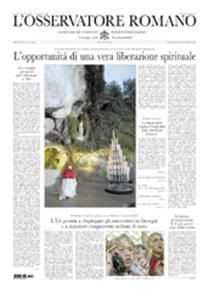
In Lourdes, Benedict XVI ends his visit to France with an appeal to a globalized world:
'An opportunity for true spiritual liberation'
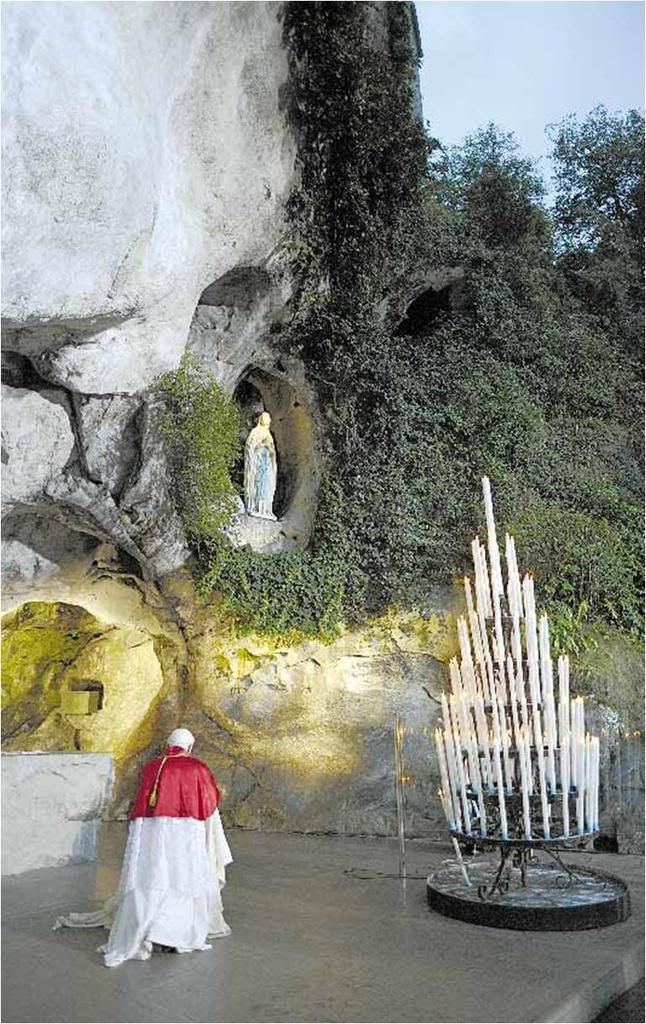
OR today contains Part 2 of the newspaper's account of the Pope's trip to France, covering his
entire Lourdes sojourn, and the texts for each event. Page 1 contains the title story which wraps
it up and an editorial entitled 'A propitious time to return to God'.
The Page 1 photograph is visually striking - it manages to capture the grotto at Massabielle as
one experiences it when one is there because it catches all the elements of rock, sky and sparse
greenery of the humble space where God manifested himself through the person of the Mother of Christ.
Equally, it is highly symbolic of the sense of the Pope's trip - a pilgrimage on multiple levels,
by the Vicar of Christ on earth as humble pilgrim among the People of God - one that will be discussed
for a long time for its wealth of spiritual, human and intellectual virtues, and hopefully, for
the fruits it will bear.
----------------------------------------------
The Holy Father has no events scheduled today.
----------------------------------------------
POPE'S MESSAGE
TO U.N. PRAYER SERVICE

The Vatican released the text of a message from the Holy Father to the Prayer Service that precedes the opening of the 6rd session of the United Nations General Assembly. Here is the text of the telegram sent in his name by the Vatican Secretary of State.
HIS HOLINESS POPE BENEDICT XVI SENDS CORDIAL GREETINGS TO ALL TAKING PART IN THE PRAYER SERVICE HELD ON THE EVE OF THE SIXTY-THIRD SESSION OF THE UNITED NATIONS GENERAL ASSEMBLY.
HE JOINS THE MEMBERS OF THE DIPLOMATIC COMMUNITY AND U.N. OFFICIALS PRESENT IN IMPLORING FROM ALMIGHTY GOD THE GUIDANCE AND STRENGTH NEEDED TO CARRY OUT THE URGENT TASKS FACING THE UNITED NATIONS IN THE COMING MONTHS, INCLUDING THE CONTINUING IMPLEMENTATION OF THE MILLENNIUM DEVELOPMENT GOALS, THE NEPAD PROGRAM AND OTHER INITIATIVES AIMED AT ENSURING THAT THE WHOLE HUMAN FAMILY SHARES IN THE BENEFITS OF GLOBALIZATION.
RECALLING WITH GRATITUDE HIS VISIT TO THE GENERAL ASSEMBLY LAST APRIL ON THE OCCASION OF THE SIXTIETH ANNIVERSARY OF THE UNIVERSAL DECLARATION OF HUMAN RIGHTS, HIS HOLINESS RENEWS HIS APPEAL TO INTERNATIONAL LEADERS TO REAPPROPRIATE THE LOFTY MORAL VISION AND THE TRANSCENDENT PRINCIPLES OF JUSTICE EMBODIED IN THE UNITED NATIONS’ FOUNDING DOCUMENTS.
WITH THESE SENTIMENTS THE HOLY FATHER INVOKES UPON ALL IN ATTENDANCE AN ABUNDANCE OF DIVINE BLESSINGS, TRUSTING THAT THESE MOMENTS OF REFLECTION AND PRAYER WILL STRENGTHEN THEM IN THEIR COMMITMENT TO UPHOLDING THE DIGNITY OF EACH HUMAN PERSON AND BUILDING A WORLD OF EVER GREATER SOLIDARITY, FREEDOM AND PEACE.
CARDINAL TARCISIO BERTONE
NB:I have to be gone the rest of the day and this is all I can do this morning.
[Modificato da TERESA BENEDETTA 16/09/2008 14:31] |
|
 16/09/2008 15:04 16/09/2008 15:04 |
|
| | | OFFLINE | | Post: 15.012 | Registrato il: 28/08/2005
| Utente Gold | |
|
 Sandro Magister summarizes the France trip in terms of its liturgical lessons - in the Pope's own words.
In Paris and Lourdes,
Sandro Magister summarizes the France trip in terms of its liturgical lessons - in the Pope's own words.
In Paris and Lourdes,
lessons from the "liturgist" Pope
On his trip to France, Benedict XVI not only defended the traditional Mass rite.
He also explained and demonstrated repeatedly what he believes to be the authentic meaning
of the Catholic liturgy of today and always.

ROMA, September 16, 2008 – In the three Masses celebrated during his trip to Paris and Lourdes, Benedict XVI followed the post-conciliar rite. But he intentionally enriched it with elements characteristic of the old rite: the cross at the center of the altar, communion given to the faithful on the tongue, while kneeling, the sacredness of the whole. [This makes it sound like he was doing all this for the first time!]
The reciprocal "enrichment" between the two rites is the main objective that impelled Benedict XVI to promulgate, in 2007, the motu proprio Summorum Pontificum, which liberalized the use of the traditional rite of the Mass, according to the Roman missal of 1962.
The opponents of the motu proprio maintain, instead, that the use of the old rite does not enrich, but rather cancels out the achievements of Vatican Council II as a whole. The French bishops have been among those most critical of the Pope's initiative, before and after the promulgation of the motu proprio.
On Sunday, September 14, meeting the bishops of France in Lourdes, Pope Joseph Ratzinger did not fail to urge them to be pastors welcoming of all, including the faithful who feel themselves most "at home" with the ancient rite.
The Pope had anticipated these ideas about the two rites of the Mass in responding to journalists during his flight to France, on Friday, September 12.
But Benedict XVI said much more on the subject during the four days of his trip to Paris and Lourdes.
In his lecture on September 12, at the Collége des Bernardins, he explained the emergence of great Western music, in the monasteries of the Middle Ages, in terms that require reflection on the diminishing quality of today's liturgical music, and on the necessity of revitalizing it in keeping with its original meaning.
In his homily for vespers at the cathedral of Notre-Dame, he called for a "beauty" in the earthly liturgies that will bring them closer to the liturgies of heaven. And he exhorted priests to be faithful to the daily prayer of the liturgy of the hours.
In the homily for the Mass on the Esplanade des Invalides, on September 13, he addressed the doctrine of the Eucharist and of the "real presence" of the body and blood of Christ in very demanding words, requiring that the Mass be celebrated with a sense of sacredness that has been largely missing in recent decades.
And Benedict XVI again returned to this "real presence" in the concluding meditation of the Eucharistic procession in Lourdes, on the evening of September 14.
With a passage dedicated to those who "cannot – or cannot yet – receive Jesus in the Sacrament, but can contemplate Him with faith and love and express our desire finally to be united with Him."
Among these can be counted the divorced and remarried Catholics, to whom the Church does not give communion. But their "desire," the pope said, "has great value in God’s presence."
To these calls to return to the authentic spirit of the liturgy, Benedict XVI also added, on September 14 in Lourdes, an illustration of the profound meaning of the Angelus Domini, the Marian prayer that he recites in public every Sunday at midday.
Here is what Benedict XVI said day by day, on each one of these points:
On the traditional Mass rite
From the press conference on the papal plane
September 12, 2008
Q: What do you say to those in France who are worried that the motu proprio "Summorum Pontificum" is a step backward with regards to the great institutions of the Second Vatican Council?
A: It is baseless fear; because this Motu Proprio is simply an act of tolerance, with a pastoral objective, for people who have been formed in this liturgy, who love it, who know it, who want to live with this liturgy. It is a small group, because it supposes an education in Latin, a formation in a certain type of culture.
But it seems to me a normal requirement of faith and pastoral practice for a bishop of our Church to have love and forbearance for these people and allow them to live with this liturgy.
There is no opposition between the liturgy renewed by Vatican II and this liturgy. Every day, the council Fathers celebrated the Mass following the old rite and at the same time they conceived a natural development for the liturgy throughout this century, since the liturgy is a living reality, which develops and keeps its identity within its development.
So there is certainly a difference of emphasis, but a single fundamental identity that excludes any contradiction or antagonism between a renewed liturgy and the preceding liturgy.
I believe there is a possibility for both types to be enriched. On the one hand, the friends of the old liturgy can and should know the new saints, the new prefaces of the liturgy, etc.
But on the other hand, the new liturgy emphasizes common participation, but it is not just the assembly of a particular community, but rather it is always an act of the universal Church, in communion with all the believers of all time, an act of adoration.
In this sense, it seems to me that there is a mutual enrichment, and it is clear that the renewed liturgy is the ordinary liturgy of our time.
On the emergence of great Western music
From the lecture at the Collège des Bernardins, Paris
September 12, 2008
The Psalms also contain frequent instructions about how they should be sung and accompanied by instruments.
For prayer that issues from the word of God, speech is not enough: music is required.
Two chants from the Christian liturgy come from biblical texts in which they are placed on the lips of angels: the "Gloria", which is sung by the angels at the birth of Jesus, and the "Sanctus", which according to Isaiah 6 is the cry of the seraphim who stand directly before God.
Christian worship is therefore an invitation to sing with the angels, and thus to lead the word to its highest destination. Once again, Jean Leclercq says on this subject: “The monks had to find melodies which translate into music the acceptance by redeemed man of the mysteries that he celebrates. The few surviving capitula from Cluny thus show the Christological symbols of the individual modes” (cf. ibid. p. 229).
For Benedict, the words of the Psalm: "coram angelis psallam Tibi, Domine" – in the presence of the angels, I will sing your praise (cf. 138:1) – are the decisive rule governing the prayer and chant of the monks.
What this expresses is the awareness that in communal prayer one is singing in the presence of the entire heavenly court, and is thereby measured according to the very highest standards: that one is praying and singing in such a way as to harmonize with the music of the noble spirits who were considered the originators of the harmony of the cosmos, the music of the spheres.
From this perspective one can understand the seriousness of a remark by Saint Bernard of Clairvaux, who used an expression from the Platonic tradition handed down by Augustine, to pass judgement on the poor singing of monks, which for him was evidently very far from being a mishap of only minor importance.
He describes the confusion resulting from a poorly executed chant as a falling into the “zone of dissimilarity” – the "regio dissimilitudinis".
Augustine had borrowed this phrase from Platonic philosophy, in order to designate his condition prior to conversion (cf. Confessions, VII, 10.16): man, who is created in God’s likeness, falls in his godforsakenness into the “zone of dissimilarity” – into a remoteness from God, in which he no longer reflects him, and so has become dissimilar not only to God, but to himself, to what being human truly is.
Bernard is certainly putting it strongly when he uses this phrase, which indicates man’s falling away from himself, to describe bad singing by monks. But it shows how seriously he viewed the matter.
It shows that the culture of singing is also the culture of being, and that the monks have to pray and sing in a manner commensurate with the grandeur of the word handed down to them, with its claim on true beauty.
This intrinsic requirement of speaking with God and singing of him with words he himself has given, is what gave rise to the great tradition of Western music.
It was not a form of private “creativity”, in which the individual leaves a memorial to himself and makes self-representation his essential criterion.
Rather it is about vigilantly recognizing with the “ears of the heart” the inner laws of the music of creation, the archetypes of music that the Creator built into his world and into men, and thus discovering music that is worthy of God, and at the same time truly worthy of man, music whose worthiness resounds in purity.
On the liturgy of the hours
From the homily for Vespers
Cathedral of Notre-Dame, Paris
September 12, 2008
The Son of God took flesh in the womb of a woman, a virgin. Your cathedral is a living hymn of stone and light in praise of that act, unique in the annals of human history: the eternal Word of God entering our history in the fulness of time to redeem us by his self-offering in the sacrifice of the Cross.
Our earthly liturgies, entirely ordered to the celebration of this unique act within history, will never fully express its infinite meaning.
Certainly, the beauty of our celebrations can never be sufficiently cultivated, fostered and refined, for nothing can be too beautiful for God, who is himself infinite Beauty.
Yet our earthly liturgies will never be more than a pale reflection of the liturgy celebrated in the Jerusalem on high, the goal of our pilgrimage on earth. May our own celebrations nonetheless resemble that liturgy as closely as possible and grant us a foretaste of it!
Even now the word of God is given to us as the soul of our apostolate, the soul of our priestly life. Each morning the word awakens us. Each morning the Lord himself "opens our ear" (cf. Is 50:5) through the psalms in the Office of Readings and Morning Prayer.
Throughout the day, the word of God becomes the substance of the prayer of the whole Church, as she bears witness in this way to her fidelity to Christ.
In the celebrated phrase of Saint Jerome, to be taken up in the XII Assembly of the Synod of Bishops next month: "Ignorance of the Scriptures is ignorance of Christ" (Prol. in Is.).
Dear brother priests, do not be afraid to spend much time reading and meditating on the Scriptures and praying the Divine Office! Almost without your knowing it, God’s word, read and pondered in the Church, acts upon you and transforms you.
As the manifestation of divine Wisdom, if that word becomes your life "companion", it will be your "good counsellor" and an "encouragement in cares and grief" (Wis 8:9).
On the real presence of Jesus in the Eucharist
From the homily, Mass on the Esplanade des Invalides
September 13, 2008
How do we reach God? How do we manage to discover or rediscover him whom man seeks at the deepest core of himself, even though he so often forgets him?
Saint Paul asks us to make use not only of our reason, but above all our faith in order to discover him. Now, what does faith say to us?
The bread that we break is a communion with the Body of Christ. The cup of blessing which we bless is a communion with the Blood of Christ.
This extraordinary revelation comes to us from Christ and has been transmitted to us by the Apostles and by the whole Church for almost two thousand years: Christ instituted the sacrament of the Eucharist on the evening of Holy Thursday.
He wanted his sacrifice to be presented anew, in an unbloody manner, every time a priest repeats the words of consecration over the bread and wine.
Millions of times over the last twenty centuries, in the humblest chapels and in the most magnificent basilicas and cathedrals, the risen Lord has given himself to his people, thus becoming, in the famous expression of Saint Augustine, "more intimate to us than we are to ourselves" (cf. Confessions, III, 6, 11).
Brothers and sisters, let us give the greatest veneration to the sacrament of the Body and Blood of the Lord, the Blessed Sacrament of the real presence of the Lord to his Church and to all humanity. Let us take every opportunity to show him our respect and our love! Let us give him the greatest marks of honour!
Through our words, our silences, and our gestures, let us never allow our faith in the risen Christ, present in the Eucharist, to lose its savour in us or around us!
As Saint John Chrysostom said magnificently, "Let us behold the ineffable generosity of God and all the good things that he enables us to enjoy, when we offer him this cup, when we receive communion, thanking him for having delivered the human race from error, for having brought close to him those who were far away, for having made, out of those who were without hope and without God in the world, a people of brothers, fellow heirs with the Son of God" (Homily 24 on the First Letter to the Corinthians, 1).
"In fact", he continues, "what is in the cup is precisely what flowed from his side, and it is of this that we partake" (ibid.). There is not only partaking and sharing, there is "union", says the Doctor whose name means "golden mouth".
The Mass is the sacrifice of thanksgiving par excellence, the one which allows us to unite our own thanksgiving to that of the Saviour, the Eternal Son of the Father.
It also makes its own appeal to us to shun idols, for, as Saint Paul insists, "you cannot partake of the table of the Lord and the table of demons" (1 Cor 10:21).
The Mass invites us to discern what, in ourselves, is obedient to the Spirit of God and what, in ourselves, is attuned to the spirit of evil.
In the Mass, we want to belong only to Christ and we take up with gratitude – with thanksgiving – the cry of the psalmist: "How shall I repay the Lord for his goodness to me?" (Ps 116:12). Yes, how can I give thanks to the Lord for the life he has given me?
The answer to the psalmist’s question is found in the psalm itself, since the word of God responds graciously to its own questions. How else could we render thanks to the Lord for all his goodness to us if not by attending to his own words: "I will raise the cup of salvation, I will call on the name of the Lord" (Ps 116:13)?
To raise the cup of salvation and call on the name of the Lord, is that not the very best way of "shunning idols", as Saint Paul asks us to do?
Every time the Mass is celebrated, every time Christ makes himself sacramentally present in his Church, the work of our salvation is accomplished.
Hence to celebrate the Eucharist means to recognize that God alone has the power to grant us the fullness of joy and teach us true values, eternal values that will never pass away. God is present on the altar, but he is also present on the altar of our heart when, as we receive communion, we receive him in the sacrament of the Eucharist. He alone teaches us to shun idols, the illusions of our minds.
Now, dear brothers and sisters, who can raise the cup of salvation and call on the name of the Lord in the name of the entire people of God, except the priest, ordained for this purpose by his Bishop?
At this point, dear inhabitants of Paris and the outlying regions, but also those of you who have come from the rest of France and from neighbouring countries, allow me to issue an appeal, confident in the faith and generosity of the young people who are considering a religious or priestly vocation: do not be afraid!
Do not be afraid to give your life to Christ! Nothing will ever replace the ministry of priests at the heart of the Church! Nothing will ever replace a Mass for the salvation of the world!
On the prayer of the Angelus Domini
From the midday Angelus message, Lourdes
September 14, 2008
Every day, praying the Angelus gives us the opportunity to meditate for a few moments, in the midst of all our activities, on the mystery of the Incarnation of the Son of God.
At noon, when the first hours of the day are already beginning to weigh us down with fatigue, our availability and our generosity are renewed by the contemplation of Mary’s "yes".
This clear and unreserved "yes" is rooted in the mystery of Mary’s freedom, a total and entire freedom before God, completely separated from any complicity with sin, thanks to the privilege of her Immaculate Conception.
This privilege given to Mary, which sets her apart from our common condition, does not distance her from us, but on the contrary, it brings her closer.
While sin divides, separating us from one another, Mary’s purity makes her infinitely close to our hearts, attentive to each of us and desirous of our true good.
You see it here in Lourdes, as in all Marian shrines; immense crowds come thronging to Mary’s feet to entrust to her their most intimate thoughts, their most heartfelt wishes.
That which many, either because of embarrassment or modesty, do not confide to their nearest and dearest, they confide to her who is all pure, to her Immaculate Heart: with simplicity, without frills, in truth.
Before Mary, by virtue of her very purity, man does not hesitate to reveal his weakness, to express his questions and his doubts, to formulate his most secret hopes and desires. The Virgin Mary’s maternal love disarms all pride; it renders man capable of seeing himself as he is, and it inspires in him the desire to be converted so as to give glory to God.
Thus, Mary shows us the right way to come to the Lord. She teaches us to approach him in truth and simplicity. Thanks to her, we discover that the Christian faith is not a burden: it is like a wing which enables us to fly higher, so as to take refuge in God’s embrace.
The life and faith of believers make it clear that the grace of the Immaculate Conception given to Mary is not merely a personal grace, but a grace for all, a grace given to the entire people of God.
In Mary, the Church can already contemplate what she is called to become. Every believer can contemplate, here and now, the perfect fulfilment of his or her own vocation.
May each of you always remain full of thanksgiving for what the Lord has chosen to reveal of his plan of salvation through the mystery of Mary: a mystery in which we are involved most intimately since, from the height of the Cross which we celebrate and exalt today, it is revealed to us through the words of Jesus himself that his Mother is our Mother.
Inasmuch as we are sons and daughters of Mary, we can profit from all the graces given to her; the incomparable dignity that came to her through her Immaculate Conception shines brightly over us, her children.
More on the traditional Mass
From the address to the bishops of France, Lourdes
September 14, 2008
Liturgical worship is the supreme expression of priestly and episcopal life, just as it is of catechetical teaching. Your duty to sanctify the faithful people, dear brothers, is indispensable for the growth of the Church.
In the motu proprio Summorum Pontificum, I was led to set out the conditions in which this duty is to be exercised, with regard to the possibility of using the missal of Blessed John XXIII (1962) in addition to that of Pope Paul VI (1970).
Some fruits of these new arrangements have already been seen, and I hope that, thanks be to God, the necessary pacification of spirits is already taking place.
I am aware of your difficulties, but I do not doubt that, within a reasonable time, you can find solutions satisfactory for all, lest the seamless tunic of Christ be further torn.
Everyone has a place in the Church. Every person, without exception, should be able to feel at home, and never rejected. God, who loves all men and women and wishes none to be lost, entrusts us with this mission by appointing us shepherds of his sheep.
We can only thank him for the honour and the trust that he has placed in us. Let us therefore strive always to be servants of unity.
More on the real presence
of Jesus in the Eucharist
From the Meditation after the Eucharistic procession, Lourdes
September 14, 2008
The sacred host is the living, efficacious and real sacrament of the eternal presence of the saviour of mankind to his Church. [...]
An immense crowd of witnesses is invisibly present beside us, very close to this blessed grotto and in front of this church that the Virgin Mary wanted to be built; the crowd of all those men and women who have contemplated, venerated, adored the real presence of him who gave himself to us even to the last drop of blood; the crowd of all those men and women who have spent hours in adoration of the Most Holy Sacrament of the altar. [...]
Saint Pierre-Julien Eymard tells us everything when he cries out: "The holy Eucharist is Jesus Christ, past, present and future."
Jesus Christ, past, in the historical truth of the evening in the Upper Room, to which every celebration of holy Mass leads us back.
Jesus Christ, present, because he said to us: "Take and eat of this, all of you, this is my body, this is my blood."
"This is", in the present, here and now, as in every here and now throughout human history. The real presence, the presence which surpasses our poor lips, our poor hearts, our poor thoughts. The presence offered for us to gaze upon as we do here, this evening, close to the grotto where Mary revealed herself as the Immaculate Conception.
The Eucharist is also Jesus Christ, future, Jesus Christ to come. When we contemplate the sacred host, his glorious transfigured and risen Body, we contemplate what we shall contemplate in eternity, where we shall discover that the whole world has been carried by its Creator during every second of its history.
Each time we consume him, but also each time we contemplate him, we proclaim him until he comes again, "donec veniat". That is why we receive him with infinite respect.
Some of us cannot – or cannot yet – receive Him in the Sacrament, but we can contemplate Him with faith and love and express our desire finally to be united with Him. This desire has great value in God’s presence: such people await his return more ardently; they await Jesus Christ who must come again.
[Modificato da TERESA BENEDETTA 16/09/2008 22:15] |
 16/09/2008 17:15 16/09/2008 17:15 |
|
| | | OFFLINE | Post: 3.321 | Registrato il: 23/11/2005
| Utente Master | |
|
Does France Have a Prayer?
Papal French.
By John F. Cullinan
National Review Online
September 16, 2008
‘France needs convinced Catholics who aren’t afraid to affirm who they are and what they believe in . . . Catholics who are fully Christian, and Christians who are fully active.”
These seem like perfectly fitting sentiments for Pope Benedict to express during his pastoral visit to France this weekend. But these are actually the words of his host, French President Nicolas Sarkozy, spoken last December at the Vatican during an unusual — and unusually thoughtful — official reflection on French secularism.
No doubt Benedict agrees. But that hardly implies across-the-board endorsement papal of Sarkozy’s political views, much less direct papal intervention in French politics, as some careless observers suggest. Hence the London Times, for instance: “Pope Benedict XVI waded into French politics [Friday], throwing his weight behind a controversial drive by President Sarkozy to put religious faith back into the life of the strictly secular state.”
That’s just plain wrong. There’s no such “drive” to alter France’s basic church-state arrangements, which everyone agrees are settled, apart from France’s substantial but poorly assimilated and poorly integrated Muslim minority (more on that another time). But it’s useful to compare Benedict’s more modest and focused agenda — and leadership style — with Sarkozy’s altogether more ambitious political program and regrettably scattershot approach.
The three-fold aims of Benedict’s pastoral visit were to (a) encourage the local church; (b) further dialogue with secular European cultures and institutions; and (c) remind the universal church, mainly through his own personal witness, that a highly intellectual faith is entirely compatible with traditional forms of devotion.
Benedict’s first and foremost aim was to encourage French Catholics, now emerging from a long period of decline and demoralization as a more compact, committed, and dynamic community. Roughly 75 percent of France’s 60 million citizens are baptized Catholics, though far fewer identify themselves as Catholics or practice their faith. Only 5 to 10 percent attend Mass on a weekly basis (versus perhaps one-third in the U.S.).
France’s trajectory from “eldest daughter of the church” (la fille aînée de l’Eglise) to “mission country” (pays de mission) — as one senior cleric acknowledged as early as the 1940s — has particularly French causes rooted in modern French history, culture, and politics. The upshot is that committed French Catholics are such by choice, rather than by tradition or convenience, and are therefore noticeably more forward-looking, hopeful, and “evangelical” than their immediate predecessors.
This “creative minority” — Benedict’s term for committed Catholics in an increasingly secular Europe — was the pope’s principal focus. In fact, Benedict’s presence brought more Catholics into the streets than any event in the past quarter century, recalling the spontaneous demonstrations that erupted against Francois Mitterand’s unsuccessful back-door attempt to close down Catholic schools.
In a revealing interview with the center-right daily Le Figaro, France’s new Catholic leader, Cardinal André Vingt-Trois, the watchword is hope, a term long absent from ecclesial parlance: “To be sure, we’ve undergone hard times since the 1970s and I expect that the Pope will encourage us to tackle the situation with hope and confidence.” He spells out these objectives:
First of all, we must intensify our spiritual life. Christians can’t tackle the issues and conflicts in the life of our society without being profoundly rooted spiritually. It follows that our church should serve as a witness for hope. The church needs to say that humanity isn’t stuck in a fatalistic trap, be it economic, ecological, or political.
Nowadays hope is in especially short supply among the French, especially the young, who find the whole system rigged against those just getting started in life. France as a whole is sharply divided between haves and have-nots, the former consisting of comfortable retirees and secure middle-aged workers (impossible to dismiss without incurring confiscatory tax penalties), protected by the heavy hand of France’s massive unionized bureaucracy and a notably risk-averse culture.
Not surprisingly, young people in France rank at the bottom of a recent international poll measuring confidence in the future (Americans ranked at or near the top). One consequence is the “flight of the young” (la fuite des jeunes), whereby the most able and ambitious are emigrating, almost invariably to the same two destinations: London and New York.
Sarkozy acknowledged the phenomenon of widespread hopelessness in his Vatican speech, explicitly linking religious faith with hope. “A person who believes is one who hopes. And it’s in the interest of the Republic that there should be men and women who hope.”
In fact, Sarkozy’s Vatican speech (official text here, partial English translation here) is an excellent example of Benedict’s second aim, namely the dialogue between faith and secular European culture. In a nutshell, Sarkozy proposed a new understanding of French secularism (laïcité), traditionally marked not only by the strict separation of church and state and state neutrality regarding belief and non-belief, but also the strict exclusion from the public square of religious arguments or symbols (like Muslim headscarves). This was often carried to the point of excluding religious believers themselves — based on the simple fact of their belief — from advancing purely secular or philosophical arguments in matters of public policy. The upshot was a pervasive climate of mutual suspicion and hostility, often marked by exceptional pettiness on the state’s part (refusing to establish institutional links with the French bishops’ conference until 1992, for instance).
In his speech, Sarkozy in effect proposed a fresh start, beginning by acknowledging the historical reality of Christian contributions to France and French contributions to Christianity. The next step, he argues, is to identify common ground and common concerns for a long-overdue dialogue. That seems wholly unobjectionable in an American context, which is perhaps why the French Left — as reflexively anti-American and anti-religious as some of their ideological counterparts here — erupted in fury.
Dialogue with religious believers and religious groups was dismissed out of hand as utterly incompatible with republican ideals. But nothing enraged the French secular establishment (led, as always, by Le Monde) as Sarkozy’s pointed observation that religious faith may offer some distinctive — and otherwise unavailable — contributions to French society. “In transmitting values and teaching the difference between good and evil,” Sarkozy said, “the teacher will never replace the [Catholic] priest or [Protestant] pastor.”
These are fighting words in a culture where teaching is widely seen the exclusive monopoly of unionized government functionaries; and where good and evil are often dismissed as outdated and dangerous categories, ideally replaced by some utilitarian calculus informed by the latest intellectual fad. The Left’s reaction may be summed up by Le Monde’s especially nasty front-page editorial cartoon, which features Sarkozy dressed up as a bishop with George Bush lamenting to Benedict that Sarkozy has stolen his job as preacher-in-chief. But a sneer isn’t an argument, much less a rebuttal.
The upshot is that Sarkozy’s Vatican speech has in fact provoked the kind of dialogue that Benedict seeks. While fixing France’s malaise is well beyond the competence and capabilities of the local church, religious voices are engaging in the dialogue for the first time in years. As Cardinal Vingt-Trois observes, Sarkozy’s speech emphasizes that “one can be a Christian and a citizen without having to hide one’s Christian identity.” That may allow an explicitly Christian critique of “brotherhood” (fraternité) — one of the Republic’s three founding ideals — as practiced today, as well as other, more philosophical explorations of French society’s demonstrable lack of solidarity towards have-nots.
Finally, Benedict’s third aim during this visit was to encourage traditional devotions as pastor of the universal church. This is a subject mainly of interest to fellow Catholics and a characteristic theme. And it’s one Benedict emphasized by beginning and ending his visit in Lourdes, the famous Marian shrine, and spending twice as long there as in Paris.
Early indications are that Benedict’s visit was successful, at least according to initial press accounts (his dense prepared texts will take longer to digest). A typical headline (from Le Figaro) reads: “Benoît XVI: ‘Friend of France’ Seduces Paris.’ It’s worth bearing in mind, however, that the French are an easy audience, provided that one speaks elegant and impeccable French, as this pope does. But one immediate result is better communication between Paris and Rome than was the case for quite some time. It’s certainly better than when Cardinal Richelieu, France’s de facto 17th-century political leader, recommended dealing with the pope by kissing his feet and tying his hands.
— John F. Cullinan, a regular NRO contributor, is an expert in international religious freedom.
|
 16/09/2008 20:17 16/09/2008 20:17 |
|
| | | OFFLINE | | Post: 15.013 | Registrato il: 28/08/2005
| Utente Gold | |
|
 Fr. Schall has wasted no time to comment on the Bernardins lecture, as epochal in its way as the Regensburg lecture. And Fr. Schall's commentary is another way to re-live it and gain some new insights. I haven't had time to search if any similar extended commentary on the Bernardins lecture has appeared in the French media, although there's quite a list already of major French intellectuals who have given their immediate reactions.
Fr. Schall has wasted no time to comment on the Bernardins lecture, as epochal in its way as the Regensburg lecture. And Fr. Schall's commentary is another way to re-live it and gain some new insights. I haven't had time to search if any similar extended commentary on the Bernardins lecture has appeared in the French media, although there's quite a list already of major French intellectuals who have given their immediate reactions.

 www.ignatiusinsight.com/features2008/schall_benxviparis_se...
www.ignatiusinsight.com/features2008/schall_benxviparis_se...
Sept. 15, 2008
The novelty of Christian proclamation consists in one fact: He has revealed Himself. Yet this is no blind fact, but one that is itself Logos — the presence in our flesh of eternal reason.
Verbum caro factum est (Jn. 1:14): Just so, amid what is made (factum) there is now Logos, Logos is among us. Creation (factum) is rational.
****
The monastery serves erudition, the formation and education of man —a formation whose ultimate aim is that man should learn how to serve God. But it also includes the formation of reason — education — through which man learns to perceive, in the midst of words, the Word itself."
- Benedict XVI, "On the Roots of European Culture"
Address to the World of Culture
College des Bernardins, Paris
September 12, 2008
I.
Modern popes lose no occasion in which it is appropriate to instruct Europe on what it is. The main reason for this effort is that few Europeans any longer know what they are because they do not know what they have been.
Europe is a continent that has largely not "lost" the faith, but freely given it up. In many ways, it is a continent taking steps so that this Christian heritage cannot be legally heard. The hearing of it is itself to be rejected. Europeans are left trying to explain themselves with what is left.
Meanwhile, they watch a shrewd Islam, which also rejects the two basic principles of Christianity — the Trinity and the Incarnation —take over its inner cities without a battle.
The Pope himself, on the recognized basis of his own intellectual stature, is a member of one of the French learned Academies. Benedict cites great French theologians all the time.
A good part of this lecture — "On the Roots of European Culture" —relied on the famous scholar, Canon Jean Leclercq, and his book about the love of letters and the love of God.
When he was in Paris, on his way to Lourdes, Benedict XVI was invited to address leaders of French culture on the very origins of the West itself. Present were the Cardinal Archbishop of Paris, along with Giscard d'Estaing, Jacques Chirac, the Mayor of Paris, UNESCO representatives, Prince de Broglie, and other dignitaries.
The lecture was presented in a very symbolic place, a revamped College that owes its origin to St. Bernard of Clairvaux, himself one of the great figures of Western monasticism.
Popes have been carted off to or escaped to France several times in history. France used to be called the Elder Daughter of the Church. No doubt some of the most beautiful cathedrals in the world are in France, in Paris itself.
One almost has to laugh, however, that Benedict, in Paris, chose as his primary topic of discourse "the culture of monasticism." Monastic life is no doubt the last thing that the modern mind thinks about. It is not even thought of very much by the Catholic mind, though I am fond of Christopher Derrick's little book on St. Benedict, The Rule of Peace.
But as Benedict will suggest, this same monastic mind was largely where Europe learned to think in the first place, with a little help from the Greeks. In these modern days, however, monasticism could hardly be more irrelevant to modern culture.
Indeed, what is worse, the subtitle of pope's discourse in Paris is "Christian worship is an invitation to sing with the angels."
Of course, the Pope's sub-title is right out of the Preface to the Mass: "Et ideo cum Angelis et Archangelis, cum Thronis et Dominationibus, cumque omni militia caelestis exerrcitus, hymnum gloriae tuae canimus, sine fine...." Then there follows the great "Holy, Holy, Holy" from Isaiah.
The Preface is no doubt sung, probably in Latin, every Sunday in Notre-Dame in Paris. Even the most secular Frenchman has heard it and is probably somewhat haunted by it.
Yet, the Pope chose this approach precisely because it reminds us of what Europe most needs to know about itself. Benedict begins with the "origins of western theology and the roots of European culture." Since monasticism was at this origin, this place of the ancient school of St. Bernard was the right place. Even the stones reminded the listeners of what the Pope had to say.
II.
The first point the Pope makes is that, even though Europe early on had to deal with the migrant invasions (not unknown today), the monks' primary concern was not "to create a culture nor even to preserve a culture from the past."
We hear this often enough that scholasticism was good because it preserved Aristotle, or the faith that produced them is nonsense but the cathedrals are lovely.
No, the monks primary purpose was "quaerere Deum" — to seek God. These monks did not "look ahead to the end of the world or to their own death," though they thought of both of these. What they were about was something else. These monks were Christians, not philosophers who had no idea of what they were looking for.
Their longing for God, however, "included ... love of the word. The search for God takes us to the Biblical word (in which) God comes towards us and we turn toward him."
To "seek" God meant to spell out what could be known of Him, taking into consideration all available sources, including revelation.
"The monastery serves eruditio, the formation and education of man — a formation whose ultimate aim is that man should learn how to serve God. But it also includes the formation of reason — education —through which man learns to perceive, in the midst of words, the Word itself."
This Pope never lets those who hear him forget that Christian revelation is also a work addressed to reason, to Logos.
Each of us is in fact made by God to return to God. This sense of "return" is included in our ontological being. It manifests itself in a search, a longing that "awakens us, makes us attentive to God."
Christian mysticism, of which St. Bernard is an outstanding example, is not an individualist thing, even though is proper to a real person. Rather it is both individual and corporate.
"The God who speaks in the Bible teaches us how to speak with him ourselves."
Reading, reading out loud, and singing focus our whole being on that which we attend to in the reading and the singing. We do not applaud the singers in Church. They too are worshippers.
The Pope turns to a favorite theme, already touched on, namely, music. "For prayer that issues from the word of God, speech is not enough: music is required."
The monastic tradition taught us how to sing as we pray and praise God. So the cynic might wonder why on earth a savvy and learned Pope bothers to talk to French politicians and intellectuals of "singing with the Angels."
It is because nothing is more important than that Europeans be reminded that the worship of God is the first duty of man and stands at the origin of their heritage.
"One is praying and singing in such a ways as to harmonize with the music of the noble spirits who were considered the originators of the harmony of the cosmos, the music of the spheres. The monks have to pray and sing in a manner commensurate with the grandeur of the word handed down to them, with its claim on true beauty."
The Pope has said elsewhere that the proof of Christianity is that it has produced beautiful things — cathedrals, Masses, paintings — in this world. ['The saints and Christian art', he said.]
The Pope next speaks of the Bible since the monks encountered the Word in the Book, about whose words they studied and sang. The Pope here renews his concern with the exegetes.
The Bible first appears as many books, not one book. The New Testament itself usually calls them "the Scriptures." "The unity of the biblical books and the divine character of their words cannot be grasped by purely historical methods."
Its unity also takes "Christological and pneumatological exegesis," which the Pope has explained more in detail in his Jesus of Nazareth. Scientific method, however useful, can only reveal what its method reveals.
The important element of Scripture is true but not the product of the method. The method, at best, will show the incoherence of what does not support the truth that is contained in Scripture.
The Pope also has a word about fundamentalism. "The Bible issues a constantly new challenge to every generation. It excludes by its nature everything that today is known as fundamentalism. In effect, the word of God can never simply be equated with the letter of the text."
One suspects that this discussion of the Scripture's multiple authorship in the one Spirit is directed as much to Islam and the Koran as to Christian fundamentalism.
Appropriately, Benedict draws out St. Paul's relation to the Spirit and the Word of God.
The Pope uses this "seeing" the spirit in the letter to show that freedom from the law is not an excuse for our not observing any law.
"It would be a disaster if today's European culture could only conceive freedom as absence of obligation, which would inevitably play into the hands of fanaticism and arbitrariness. Absence of obligation and arbitrariness do not signify freedom, but its destruction."
This latter, no doubt, is a remarkable sentence since almost all Western courts have come to the view that freedom does not mean anything but civil law. This law is changeable at the will of whomever, the people, the government, the culture, and the courts. It is the truth that makes us free, not its absence or impossibility.
III.
The monastic tradition of St. Benedict not only spoke of praying and singing and preserving the Word, but of working.
"Manual work is a constitutive element of Christian monasticism." The Hebrew tradition already included the value of work as we learn from the fact that Jesus Himself was the son of a carpenter, the Apostles fished or collected taxes, and Paul made tents.
This sanctification of work meant the transformation of the idea of slavery as it existed in the ancient world, as the Pope remarked in Spe Salvi when referring to the Epistle to Philemon.
This approach to monastic work involved the understanding of God as a creator.
"The Christian God is different: he, the one, real and only God, is also the Creator. God is working; he continues working in and on human history. In Christ, he enters personally into the laborious work of history."
What happens is that human work is not simply a necessary drudgery to be done by those who are least capable. It is "a special form of human resemblance of God, as a way in which man can and may share in God's activity as creator of the world."
The Pope reminds his listeners in Paris that this "culture of work" is related to the very "emergence of Europe." Without its "ethos and its influence, Europe's influence on the world would be "unthinkable."
Work is a sharing of the divine work, but it is not independent of it. God works and we work, as the ancient phrase went.
"In this word (found in things), God himself has set out towards men, and hence men can come to God through it."
European culture is filled with a "word-ness," itself rooted in the Logos. Benedict points out that Christians see it necessary and important to explain to others just what they are about in intelligible and non-polemical terms.
"The classic formulation of the Christian faith's intrinsic need to make itself communicable to others is a phrase from the First Letter of Peter, which in medieval theology was regarded as the biblical basis for the work of theologians: 'Always have your answer ready for people who ask you the reason (the logos) for the hope that you have' (Logos, the reason for hope, must become Apo-logia, word must become answer' (3:15)."
The early Christians did not think that their "missionary proclamation" was an effort to enlarge the community numbers. Rather it came from faith itself. This lead to "who" had revealed Himself in the history of Israel and finally in the Son. This account was the real "answer" that all men were implicitly seeking.
"The universality of God, and of reason open toward him, is what gave them the motivation — indeed, the obligation — to proclaim the message. They saw their faith as belonging, not to cultural custom that differs from one people to another, but to the domain of truth, which concerns all people equally."
This is a remarkable statement and neatly stated. The modern tendency is to identify religion and culture so that the religion is bound to culture. Thereby it cannot be considered universal. This is why Christianity from the beginning addressed itself not to "religion" or the "myths" but to philosophy. It intended to stand on the ground of knowable truth.
Thus, the Christian faith presupposes the fact that men, wherever they are, seek the truth, however they call it. This "seeking" wants clarity; it wants to know.
This means that the Christian explanation of itself is not "alien" but intrinsic to something already found within the restless hearts of all men who wonder why they are unsettled.
"Paul is not proclaiming unknown gods. He is proclaiming him whom men do not know and yet do know — the unknown-known; the one they are seeking, whom ultimately they know already, and who yet remains the unknown and the unrecognizable." [This was the context of the Pope's statement in Aparecida about the indigenous peoples of Latin America (as he explained at the Vatican later) which the media and some politically-motivated groups tried to fan into a post-Regensburg-like uprising. But God provides, and the protets spluttered out after a few days. Even the media did not find it worthwhile to pursue: philosophy does not make news - it's not easy to reduce it to a soundbite.]
Men suspect that, at the beginning of all things, we find "creative reason" - "We find "not blind chance, but freedom." The point the Pope makes is that the very being of every person experiences this unsettlement. This is why revelation is never completely alien as it does address something that we all know in ourselves.
God is not imaginary or invented. This is why, at bottom, God must reveal Himself if we are to know Him. The answer to our unsettlement does not lie on our side. We cannot "force" God's hand, as it were. This capacity would make us already gods.
"A God who is merely imagined and invented is not God at all. If he does not reveal himself, we cannot gain access to him. The novelty of Christian proclamation consists in one fact: he has revealed himself. Yet this is no blind fact, but one that is itself Logos — the presence in our flesh of eternal reason." [What a felicitous expression!]
The burden of the Pope's Jesus of Nazareth was precisely that in the documents and reflection on them, no other explanation is possible but that Jesus did claim to be both man and God.
"Amid what is made (factum) there is now Logos, Logos is among us. Creation (factum) is rational." These are very precise, startling words.
The Pope concludes his discourse to cultural leaders by reminding them that in some ways our time is like that of Paul's time in Athens.
"But our cities no longer are filled with altars and with images of multiple deities." God is unknown to us. Yet, men seek, and they seek an explanation like the great monks.
"Quaerere Deum — to seek God and to let oneself be found by him, that is today no less necessary than in former times." These latter words are, to the Pope's listeners, the crucial ones, the "letting ourselves be found."
If anything, this "letting" or "not letting" is what characterizes modernity, not the fact that we seek, nor the fact that God, on His part, seeks us.
Positivist reason wants to make the search for God purely subjective and therefore unscientific. This sort of science, the Pope remarks, is in fact "the capitulation of reason, the renunciation of its highest possibilities, and hence a disaster for humanity."
The foundation of European culture was based on two principles or openings: "The search for God and the readiness to listen to him." These two, the searching and the listening, better than anything else, describe our souls.
Benedict's two principles are the "basis of any culture" not just Western culture or medieval culture. In other words, the foundations of the cultures of the world remains to be established.
This is Benedict's real vision of world history in his time. This basis is why what is revealed needs to be understood as logos. This is why, too, it is often greeted, as in the case of Paul at the stoning of Stephen, with closed ears.
The political and cultural frontiers of our nations, including our Western ones, are now, in many ways, deliberately designed so that this hearing could not take place.
Benedict's address to the French intellectual and political elite, recalling the monastic tradition, had two sides. We searched for the reason of things and God sent the Logos to dwell amongst us. The spiritual drama of modernity is that it is afraid to listen to the inner coherence of the two reasons.
The Pope's Bernardins lecture is sheer reading delight, producing the same mental exhilaration as the Regensburg lecture, the encyclicals and Jesus of Nazareth.
But then, the entire corpus of the papal texts on this visit to France - from the speech at the Elysee to the farewell speech at Tarbes-Lourdes airport - produces the same exhilaration and wonder: that one mind/soul/spirit can manage to convey the message of Christ day after day, abroad or back at the Vatican, and always in a way that is new and illuminating and inspiring and truly soul-stirring.
Pope Benedict XVI is giving us the experience that the contemporaries of the great Fathers of the Church must have felt in their time.....DEO GRATIAS.
|
 16/09/2008 23:26 16/09/2008 23:26 |
|
| | | OFFLINE | | Post: 15.014 | Registrato il: 28/08/2005
| Utente Gold | |
|
 Thanks to Lella's blog
Thanks to Lella's blog
 here is an unsigned commentary from another one of those feisty northern Italian newspapers - Brescia Oggi (Brescia today), from the hometown of Paul VI - that I found quite original.
The 'miracle' in
here is an unsigned commentary from another one of those feisty northern Italian newspapers - Brescia Oggi (Brescia today), from the hometown of Paul VI - that I found quite original.
The 'miracle' in
the homeland of secularism
Translated from

And so it seems the last revolutionary of our time has breached the last wall - that of secularism, the arch-enemy of the dialog between faith and reason.
Remember those those 67 wise guys at La Sapienza who last January signed a manifesto that for the first time in history prevented a Pope from setting foot in a university! [One established by a Pope, no less.]
And compare them to the incredible popular enthusiasm which accompanied Benedict XVI during his entire four-day visit in France. [Not to mention the reception from the intellectual world and the French media which have always thought of themselves as part of the intelligentsia!]
"Mission impossible' for the Pope, the leftist French newspaper Liberation had said on the eve of the visit - but Benedict's visit was nothing less than a triumphal progress from one event to the next.
In the very heart of the nation that was the cradle of the Enlightenment, the French Revolution, and the secularism that resulted. One that had come to be the very symbol for the supposed irreconciliability between believers and secularists.
And yet, in receiving the Bishop of Rome at the Elysee Preisdnetial Palace, President Nicolas Sarkoy re-stated what he had said at the Lateran last December, in even stronger words: "It would be folly for us to deny ourselves religion, an error against culture, and an error against thought."
How are we to explain such a change in perspective?
Above all, a long-range effect going back to Regensburg. Those who said then (and who may still insist so today) that the Pope's address on September 12, 2006, was nothing but an unfortunate gaffe, should stop and measure the effect over time that Benedict XVI's discourse on faith and reason has made on the conscience of the world.
Papa Ratzinger's exhortation went to the heart of a central issue in our time: the necessary relationship between faith - which should not be spread, much less, imposed, by the sword - and freedom of conscience.
That lectio magistralis in a German university was an explicit condemnation of any pretext - past, present or future - to 'impose' any faith by means other than reason and free choice.
One might even say that making the argument for faith and reason a cornerstone of his Pontificate has conferred on Benedict XVI a global authoritativeness and earned him universal consensus among men of good will.
A consensus sufficient to seal, on the second anniversary of that Regensburg lecture, a kind of holy alliance between the secular world and the Church, in the name of that 'positive secularity' invoked by President Sarkozy as the compass which should orient the State in its relations with religions.
Were it not that the Pope is in Lourdes - and it might seem faintly sacrilegious to say so, one might indeed refer to this development as a kind of miracle.
But it is not out of place to say, in the case of Papa Ratzinger, that he has been truly 'revolutionary'.
It might bear pointing out that one of the French philosophers now interested in the role of religions in society is none other than Regis Debray, who as the Marxist philospher-guru of the 1960s, was a companion in arms to Che Guevara. [He was among the guests at Bernardins - I must look for any reaction/comment from him!]
[Modificato da TERESA BENEDETTA 16/09/2008 23:29] |
 17/09/2008 02:33 17/09/2008 02:33 |
|
| | | OFFLINE | Post: 3.322 | Registrato il: 23/11/2005
| Utente Master | |
|
Pope highlights liturgical excellence during recent trip to France
By John Thavis
Catholic News Service
September 16, 2008
VATICAN CITY (CNS) -- One of the subthemes of Pope Benedict XVI's recent visit to France was liturgical excellence, a lifelong concern of the German pontiff that has carried over into his papal agenda.
The pope didn't zero in on specific liturgical problems in France, but he repeatedly reminded his audiences in Paris and Lourdes why quality matters when it comes to worship.
Speaking Sept. 12 in Notre Dame Cathedral, which he called "a living hymn of stone and light," the pope used the setting to illustrate the Christian community's age-old effort to reach for splendor when praying to God.
"Certainly, the beauty of our celebrations can never be sufficiently cultivated, fostered and refined, for nothing can be too beautiful for God, who is himself infinite beauty," he said.
But he said church liturgies should be carried out in order to offer, as closely as possible, "a foretaste" of eternal salvation.
The same evening, speaking to academics about the contributions of monastic culture, he singled out singing and chant as outstanding forms of prayer, particularly for some books of Scripture like the Psalms.
"For prayer that issues from the word of God, speech is not enough: Music is required," he said. For the church, it's an opportunity to "sing with the angels" and lead the word to its highest destination, he said.
But liturgical singing, as the monks knew well, demands excellence, the pope said. Such song is measured according to the very highest standards because, in communal prayer, "one is singing in the presence of the entire heavenly court," he said.
The pope said the importance of monastic singing was illustrated by a remark St. Bernard made about the poor singing of monks: that a badly executed chant actually made the community more remote from God.
The pope went on to say that the idea of speaking with God through song is what gave rise to the great tradition of Western music.
"It was not a form of private 'creativity,' in which the individual leaves a memorial to himself and makes self-representation his essential criterion," he said.
"Rather it is about vigilantly recognizing with the 'ears of the heart' the inner laws of the music of creation, the archetypes of music that the Creator built into his world and into men," he said.
At Lourdes, the pope spoke in sermons about the importance of recognizing the real presence of Christ in the Eucharist and the effect that should have on liturgical practice.
When Catholics contemplate the sacred host, they meditate on Christ past, present and future, he said.
"We contemplate what we shall contemplate in eternity, where we shall discover that the whole world has been carried by its Creator during every second of its history," he said.
"That is why we receive him with infinite respect," he said.
Pope Benedict, who relaxed restrictions on the use of the Tridentine rite a year ago, told reporters on his way to France that the new Mass approved after the Second Vatican Council remains the "normal" liturgy for the church.
The pope's own liturgies in France, as in Rome, have followed the new rite, but they have also introduced traditional touches, such as placement of the cross in the center of the altar.
Another change in Roman liturgies also is being used on papal trips: In Paris and Lourdes, those receiving Communion from the pope received the host on the tongue while kneeling.
|
 17/09/2008 03:56 17/09/2008 03:56 |
|
| | | OFFLINE | Post: 3.323 | Registrato il: 23/11/2005
| Utente Master | |
|
Thanks, Teresa
...for all the translating about the pope's trip to France. Since the English-speaking media has written very little about it, the best way to see what Benedict has been saying and doing there has been to keep checking your posts on the forum.
I am delighted to see that, just as in the U.S., Australia, and other countries, the Benedict effect kicked in as soon as the pope landed. People who had been critical and derisive before he arrived turned 180 degrees and became Benaddicts. Papa's unique blend of intellectual and spiritual brilliance softened by his sweetness, gentleness, and humility knocked everybody out.
Long live B16. ![[SM=x40794]](http://www.vocinelweb.it/faccine/felici/felici-set1/62.gif)
 It was my pleasure, Benefan, as always! I would go crazy with B16-deficiency if I only had to depend on the Anglophone media for the news about our beloved Benedict.... I am just sorry I 'lost' the rest of the day yesterday to do any more work on the Forum as I was suddenly called on to prepare a Powerpoint lecture to be used today on a condition called Klinefelter syndrome! Nothing could be farther from the exalted subject we have on the Forum... I hope I can make up in some measure today, because I am sure the articles for translation will have mounted meanwhile... and there's the catechesis today... So let me go get started now on my daily Forum routine first...
It was my pleasure, Benefan, as always! I would go crazy with B16-deficiency if I only had to depend on the Anglophone media for the news about our beloved Benedict.... I am just sorry I 'lost' the rest of the day yesterday to do any more work on the Forum as I was suddenly called on to prepare a Powerpoint lecture to be used today on a condition called Klinefelter syndrome! Nothing could be farther from the exalted subject we have on the Forum... I hope I can make up in some measure today, because I am sure the articles for translation will have mounted meanwhile... and there's the catechesis today... So let me go get started now on my daily Forum routine first...
TERESA
[Modificato da TERESA BENEDETTA 17/09/2008 12:14] |
 17/09/2008 12:57 17/09/2008 12:57 |
|
| | | OFFLINE | | Post: 15.016 | Registrato il: 28/08/2005
| Utente Gold | |
|

OR today.
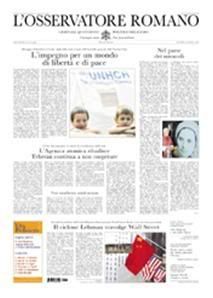 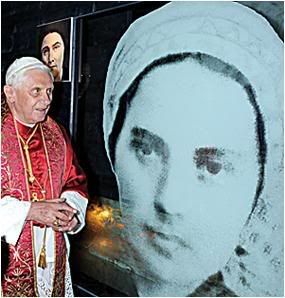
Benedict XVI's message on the eve of the 63rd session of the UN General Assembly:
'Commitment to a world of freedom and peace'
The photograph illustrates a front-page editorial on the Holy Father "In the country of miracles'.
Other Page 1 stories: The International Atomic Energy Agency says Tehran continues not to cooperate;
North Koreans launch test missile; Lehman Brothers bankruptcy throws Wall Street into turmoil.
THE POPE'S DAY
The Holy Father reported on his trip to France at the General Audience held in Aula Paolo VI today.
He returned to Castel Gandolfo afterwards.
The Vatican said that yesterday at Castel Gandolfo, the Holy Father met with
- Cardinal Joachim Meisner of Cologne.
- Col. Elmar Theodor Mäder, outgoing Commandant of the Swiss Guard, on his farewell visit.
[Modificato da TERESA BENEDETTA 17/09/2008 12:58] |
 17/09/2008 13:10 17/09/2008 13:10 |
|
| | | OFFLINE | | Post: 15.017 | Registrato il: 28/08/2005
| Utente Gold | |
|
 GENERAL AUDIENCE TODAY
GENERAL AUDIENCE TODAY
 A full translation of the Pope's 'report' on his visit to France today has been posed in
A full translation of the Pope's 'report' on his visit to France today has been posed in AUDIENCE & ANGELUS TEXTS.
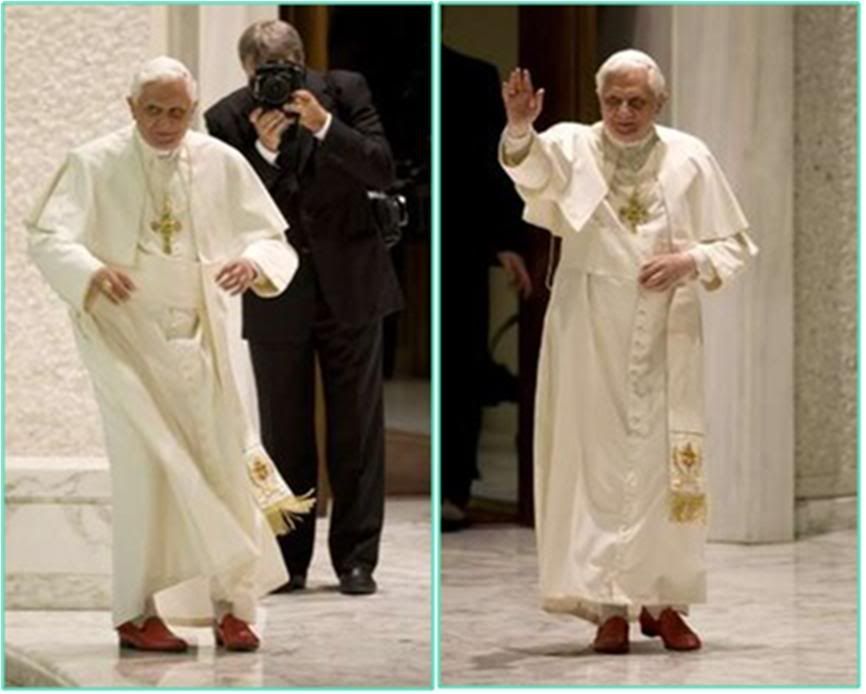
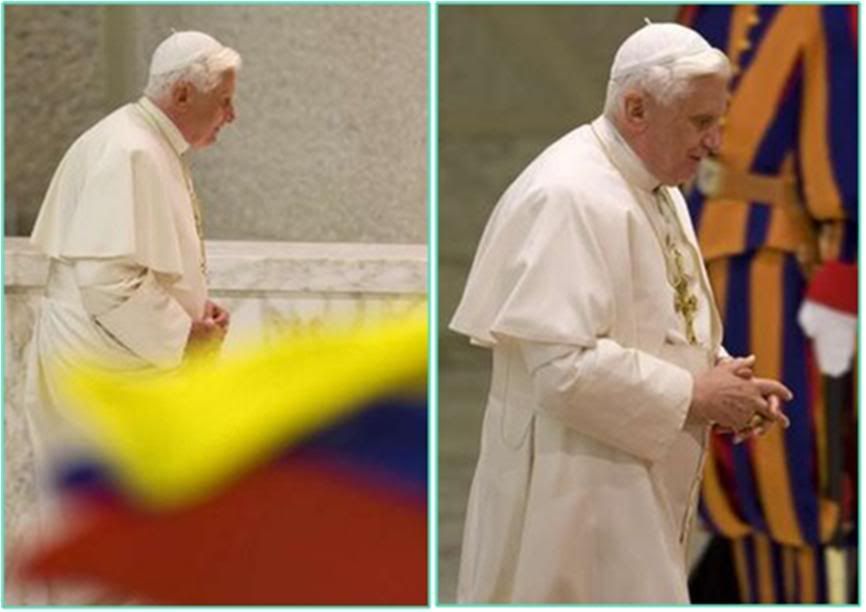
Following tradition, the Holy Father today used the first General Audience after his return from France to report on his recent trip.
He flew by helicopter to the Vatican from Castel Gandolfo for the audience which was held in the Aula Paolo VI. He returned to Castel Gandolfo afterward.
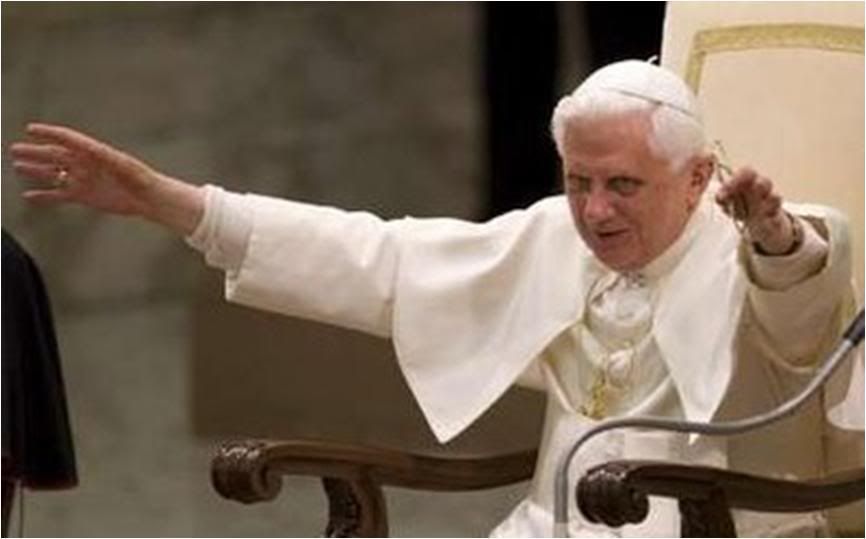
Here is what he said in English:
Our encounter today gives me the opportunity to retrace the steps of my recent Pastoral Visit to France.
After a warm welcome in Paris, I met with men and women from the world of culture, with whom I reflected on the monastic ideal of seeking God — quaerere Deum — as the bedrock of European culture. I wished to emphasize that meditation on the Scriptures opens our minds and hearts to the Logos, God’s Creative Reason in the flesh.
In the magnificent Cathedral of Notre-Dame, I gathered with bishops, priests, religious and seminarians, sharing with them the treasures of the Holy Spirit and the Cross.
My brief stop at the Institut de France was followed by the joyful Eucharistic celebration on the Esplanade des Invalides. I then made my way to Lourdes to join thousands of pilgrims in this Jubilee year commemorating the apparitions of Our Lady to Saint Bernadette.
The Holy Mass near the Grotto of Massabielle providentially coincided with the Feast of the Exaltation of the Cross, the perennial sign of the "mystery of death and of glory".
The Cross demonstrates that God so loved the world that he gave us his only Son. It teaches us that there is no genuine love without suffering, and no gift of life without pain.
Lourdes is thus a school of faith and hope because it is a school of charity and service. I am deeply grateful to God and to all who made this trip a blessed, memorable success.
Thank you!

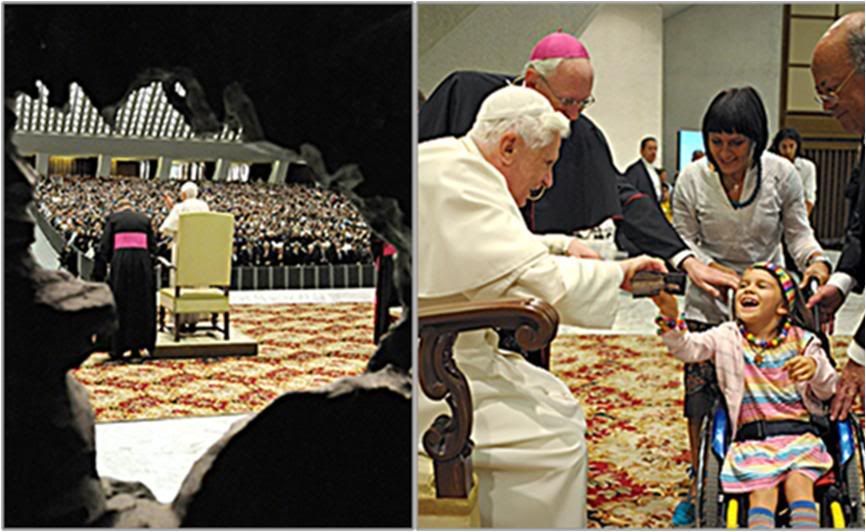
[Modificato da TERESA BENEDETTA 18/09/2008 13:54] |
 17/09/2008 13:41 17/09/2008 13:41 |
|
| | | OFFLINE | | Post: 15.018 | Registrato il: 28/08/2005
| Utente Gold | |
|
 Technical problems with Avvenire's online viewing platform kept me from being able to consult the newspaper online during the Pope's visit to France, but thankfully, one can go back to previous days (entire issue available on PDF), unlike OR which keeps its selection of the day's contents only until it posts that for the next day. I'm working backwards, so here first is Avvenire's spread from their 9/17/08 issue:
Technical problems with Avvenire's online viewing platform kept me from being able to consult the newspaper online during the Pope's visit to France, but thankfully, one can go back to previous days (entire issue available on PDF), unlike OR which keeps its selection of the day's contents only until it posts that for the next day. I'm working backwards, so here first is Avvenire's spread from their 9/17/08 issue:
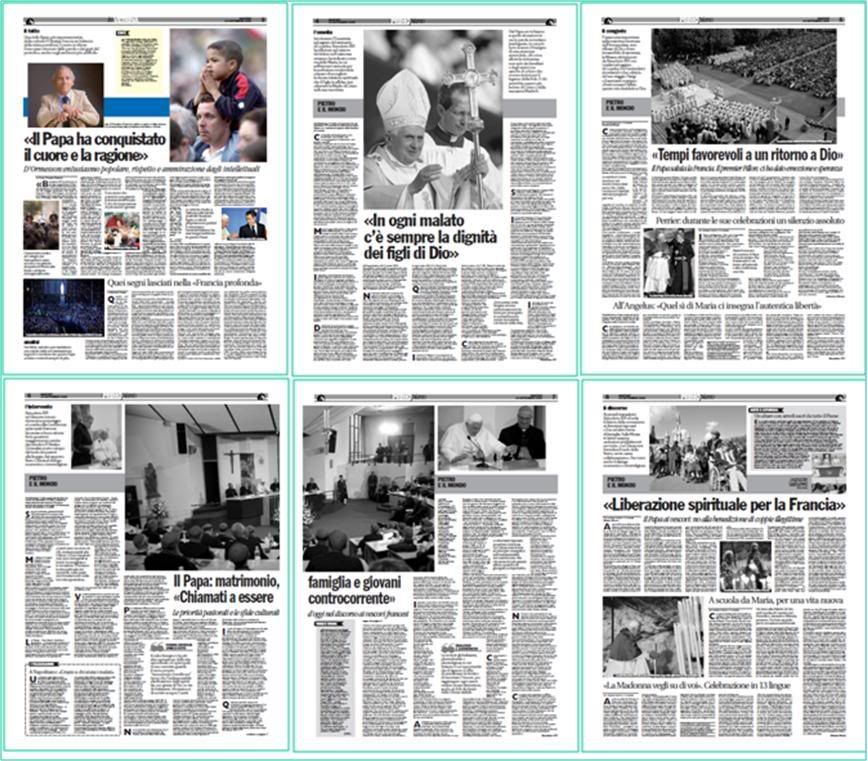 French academician says
French academician says
Pope Benedict conquered
the heart and the mind
of the French people
by DANIELE ZAPPALA in Paris
Translated from
the 9/16/08 issue of

"Benedict XVI achieved a triumph, especially with the French intellectuals."
Framing thus a preliminary assessment of the Pope's apostolic voyage to France was Jean d'Ormesson, who has been for decades one of the most representative figures of Trans-Alpine culture [both the French and the Italians use the word to describe each other in geographical terms] - as a novelist whose works have been translated around the world, essayist, editorial writer, newspaper editor, and one of the 'immortals' of the Academie Francaise.
Benedict XVI, he said, had struck the heart and mind of the nation,
"He aroused a high level of fervor and popular enthusiasm, in a climate which seems to me to be more calm, particularly between Christians and other religions, as well as between Christians and atheists."
Which moments of the trip particularly impressed you?
The crowd of intellectuals at the lecture that the Pope gave at the College des Bernardins. The lecture was a bit difficult, but it was listened to and commented on with great attention and seriousness, as well as with great intellectual sympathy for the power and rigor of its argumentation.
And did that leave a mark?
Everyone knew that Joseph Ratzinger is a great theologian and I think that his discourses have impressed Catholic intellectuals as well as non-believers. He is a man of very great intellectual power. and this is probably what impressed them most, even the young people who contributed to the great success of his visit.
Which part of the Pope's message would be most reflected upon?
I think that above all, it is the Pope's personal style, which is so different from that of John Paul who was a Pontiff who, so to speak, occupied center stage. Benedict XVI, on the other hand, is seen more as a man seated in his study - a theologian engaged in tilling the ground for Catholicism, digging deeper more than enlarging it.
He is not afraid to use a certain rigor to make sure that the faith can be corroborated to the maximum by reason.
There are those who said that the Pope was a professor in Paris and a pilgrim in Lourdes. What is your opinion?
A professor in Paris, certainly! His lecture, in many ways, was more like a master course at the College de France rather than just a simple academic lecture at the Sorbonne. And as for his pilgrimage to Lourdes, what struck me most was his capacity to be the guardian of the faith. In his address to the bishops of France, he showed great rigor on many points.
The Pope reiterated once again that faith and reason are inseparable. Was that also a message to that France which still confuses reason with rationalism?
Fides quaerens intellectum[Faith seeks understanding of itself] is an old formulation that is known even in France. For St. Thomas Aquinas itself, faith and reason are not far apart. In France, this tradition is linked above all to Descartes, and serious intellectuals are sensible about this.
But one must always look deeper into the sense, as the Pope does, who can talk to intellectuals as well as he can to the masses In any case, reason plays a very important role in Benedict XVI's message.
The young people also flocked to the Pope here...
That really impressed me. The Pope's intellectual rigor has gone far beyond limited groups to reach even young people. It reminded me of the many visits here of John Paul II.
The need for a positive or open kind of secularity was defended by the Pope at the Elysee. Do you think France is about to turn the page on its traditional secularism?
On this point, there have been manifestations of opposition, Bu they don't have to do with the religious aspect, rather with calculations that are plain and simply political. The Socialists protest saying that secularity does not need any adjectives. And it is curious that someone like Francois Bayrou, who is very Catholic, has joined himself to them in this. But above all, it is an opportunity for his opponents to attack Nicolas Sarkozy. It's a matter of internal politics.
Should we look forward to a new conflict between the secularists and the Church?
I think that in this respect, France has achieved a certain pacification in the past few years. Of course, there will always be ironic or satirical anti-clerical attacks from certain circles represented by the journal Le canard enchaine - but that is something that is very French and will go on.
But it would be excessive to speak of Christianophobia. Yes, there exists in France a tradition of anti-clericalism in literature, in art and in politics, which started before the Revolution. That tradition remains active.
At the Mass at Invalides, there were French of every condition and origin. In a nation that is becoming increasingly multi-ethnic, the universality of the Church appeared capable of uniting all the classes of society...
That is true. At the same time there is a crisis of vocations in France, which the Pope referred to. The following months and years will show whether the popular enthusiasm that was so evident will also be followed by a new and profound religious movement.
 Another major Avvenire spread was on Sunday, 9/14, which wrapped up the Paris stage of the trip and covered the start of the pilgrimage to Lourdes. Here are the accompanying editorial commentaries and photos.
Another major Avvenire spread was on Sunday, 9/14, which wrapped up the Paris stage of the trip and covered the start of the pilgrimage to Lourdes. Here are the accompanying editorial commentaries and photos.
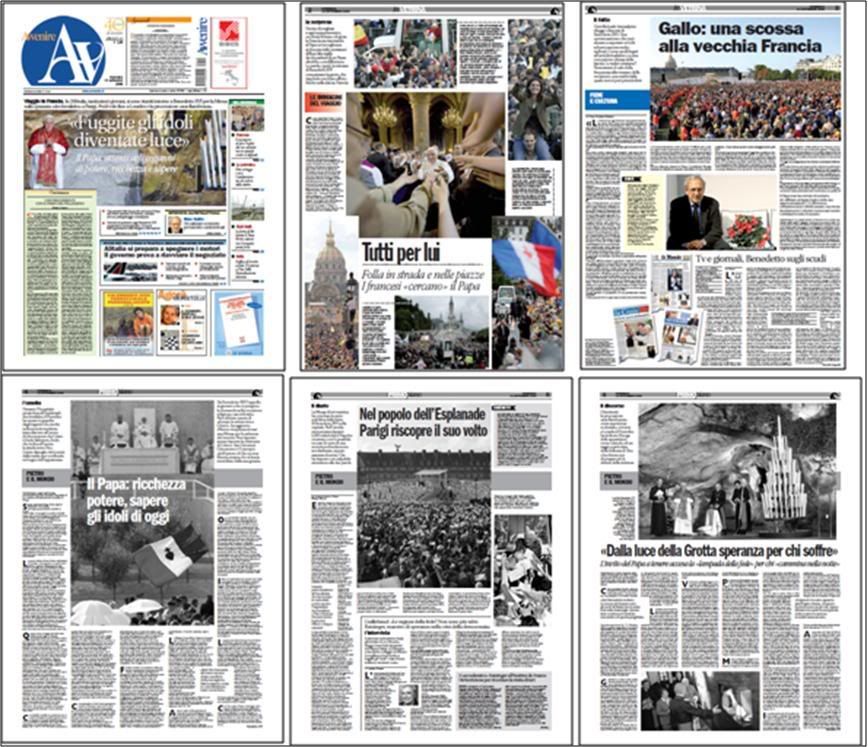
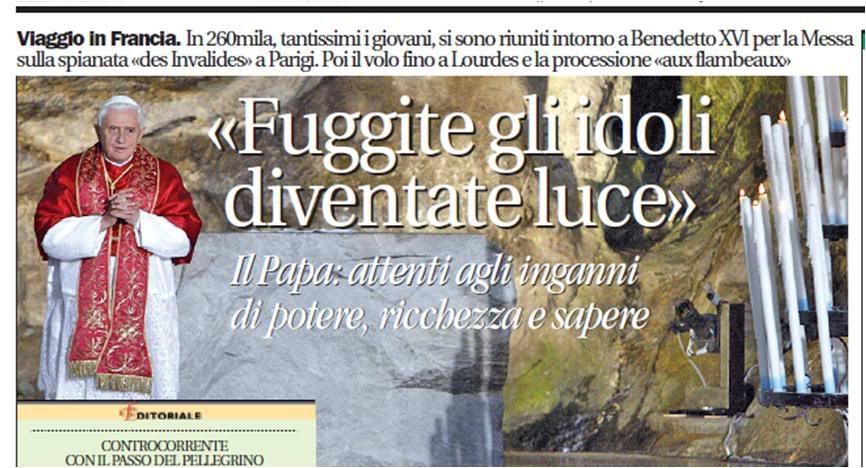 IMAGES OF THE POPE'S VISIT
Translated from
IMAGES OF THE POPE'S VISIT
Translated from
the 9/14/08 issue of

As it was in the United States, and as it was in Sydney.
So it was in France, where the people took charge of putting the lie to the customary dire prognostications for the Pope disseminated by the French media on the eve of Benedict XVI's arrival in Paris - that he could only expect to be greeted with chilliness, indifference, and/or protests.
Instead, very much to the contrary, people filled the streets beyond anything ever expected, if only to see Benedict XVI pass by for a fleeting moment.
Everywhere the Pope went, the crowd gathered - and everywhere, what he said and did, his simplest gestures as well as his Eucharistic celebrations, appeared to strike directly into the heart of believers as well as those who were simply there out of curiosity.
Benedict XVI is able to speak persuasively to the mind and the heart, and people seek him out. They want to see him and get to know him, afterwards expressing every time the joy of an encounter with a man who carries with all the power of his kindness that which many are looking for but fail to find elsewhere: hope, confidence, courage to proclaim the faith in public, a reminder of all that makes us who we are and what ties us all together so profoundly.
Every crowd has its own secret trigger and every nation makes its own history. But one cannot but be struck that wherever Benedict goes as a pilgrim - we witness scenes like those we document on this page.
And these pictures can only hint at the atmosphere one breathed on these occasions among the people, in Paris as in Lourdes.
Peter came to France. And it seems that he couldn't have come soon enough for France.
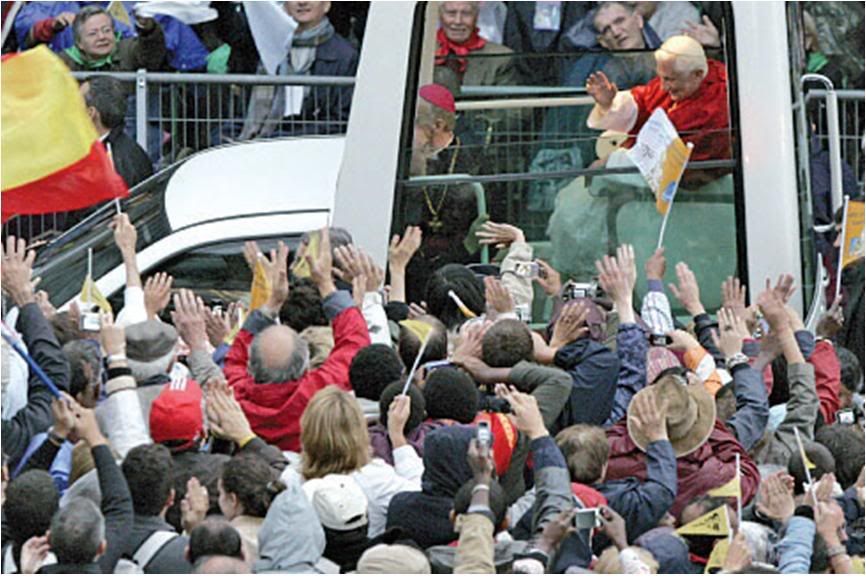
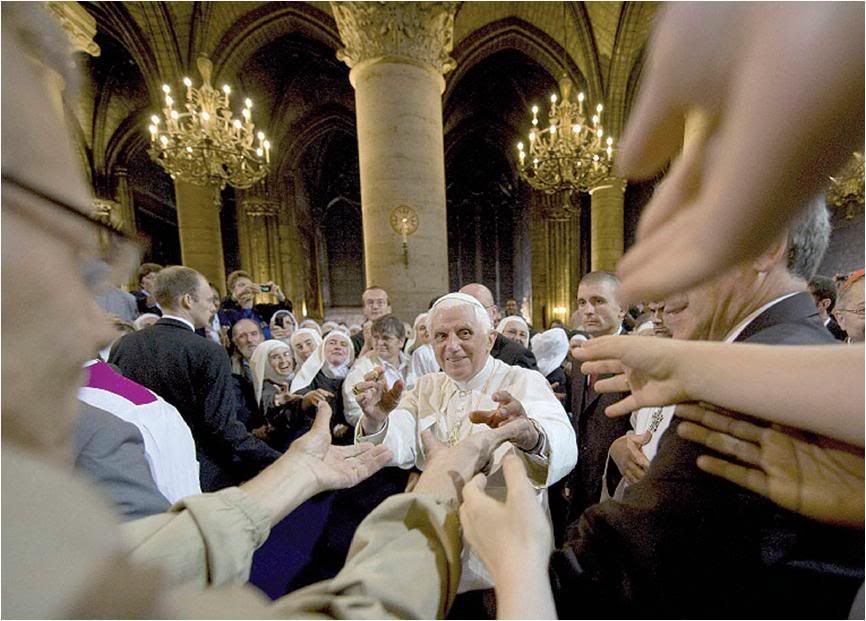
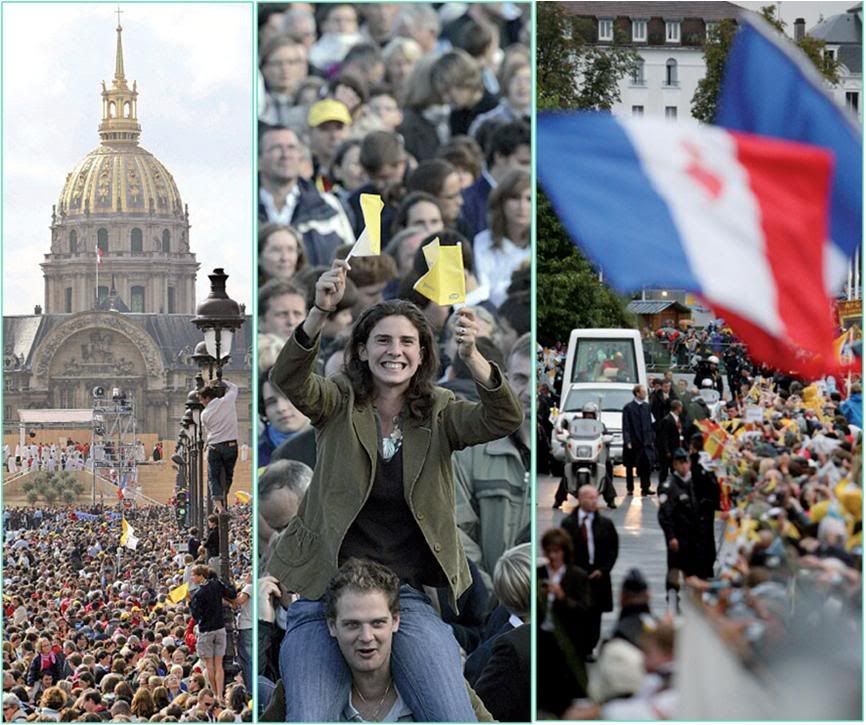
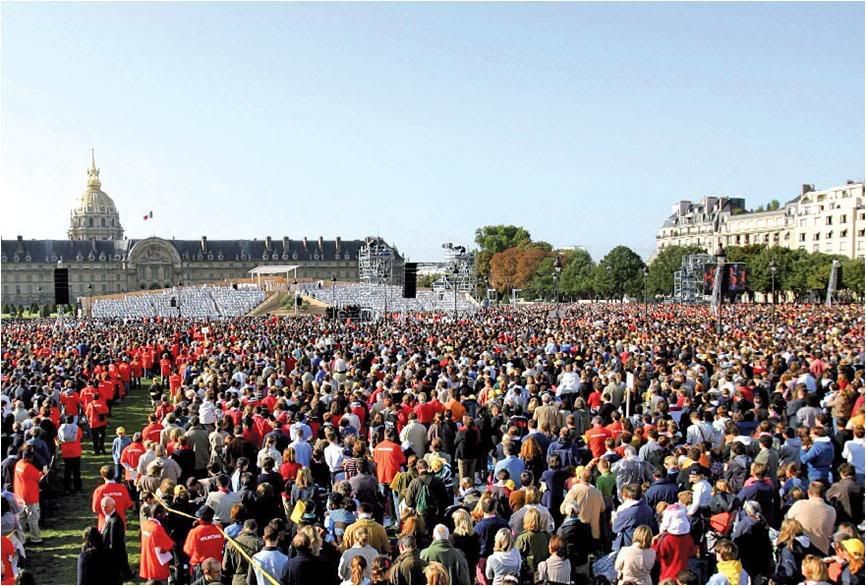
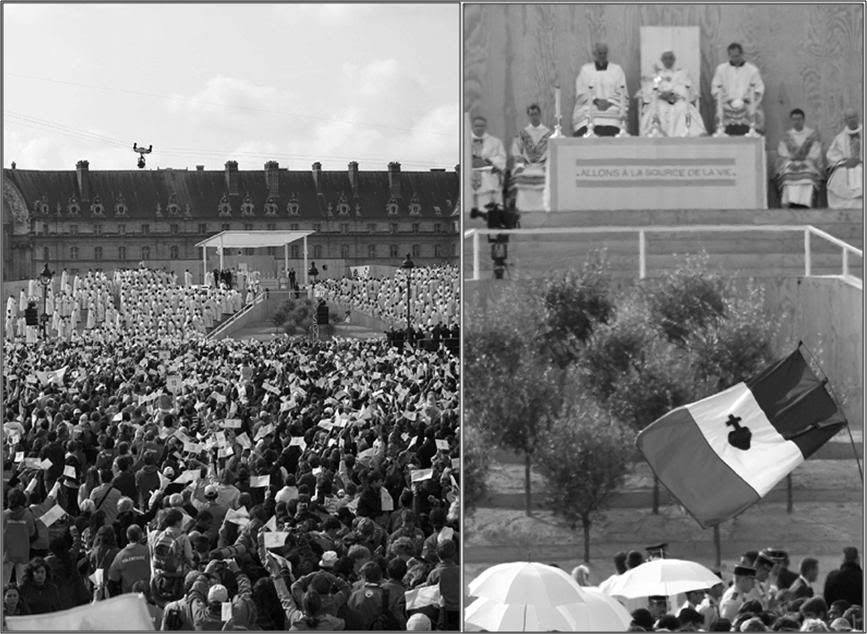 All for him:
All for him:
On the streets and in the squares,
the French seek out the Pope
Translated from
the 9/14/08 issue of

Tens of thousands at every event in an atmosphere of feasting and of joy - France has given the Pope a welcome far beyond the predictions just before he arrived about a nation that would be 'cold' and 'indifferent' to him.
But the words, the actions, the kindness of Benedict XVI wins over people who respond to him with their affection. Even in secular France.
There were more than 250,000 of them at the Esplanade des Invalides Saturday morning, in the heart of Paris. At least 140,000 were expected for the Mass in Lourdes on Sunday, where Saturday night, the crowd for the Pope was already enormous.
The numbers, substantially greater than projected, document the wave of interest and even passion that has marked the attention in France to this first visit by Benedict XVI.
The major French media outlets - who have been at best cautious if not downright polemical in the days preceding the trip - had changed their tone by Saturday, the Pope's second day in France, 'forced' to report what everyone could see on the streets and in the public squares. People everywhere, and every one happy to be able to 'embrace' the Pope if only symbolically.
And in their encounter with the Pope on Friday evening, in front of Notre Dame, the enthusiasm of the young people could only sweep away any remaining prejudices.
The Popemobile appeared to inch itself across the sea of people on the streets as it took the Holy Father to the Mass site at Invalides - with everyone waving the Vatican flag to show the Pope he was welcome in the City of Lights and the cradle of the Enlightenment.
This extraordinary welcome from the city of Paris, one of the most cosmopolitan and multi-cultural cities in the world, perhaps uncovered
a vein that courses through the nation but which has not found exposure in popular culture and the media: the Pope was awaited, there is a part of France that is anxious to see him and to listen to him.
Lourdes is the spiritual heart of France, a place from which it is hard for anyone to be the same person after having been there. Everyone who has experienced it knows that. So many wanted to be there with the Pope, who has not lost any occasion to link his Pontificate to the example of Mary.
The welcome he got Saturday night in Lourdes showed that devotion to Our Lady, the Rosary, and the idea of pilgrimage itself are by no means 'out of fashion". And that is confirmed by this surprising France at the start of the third millennium.
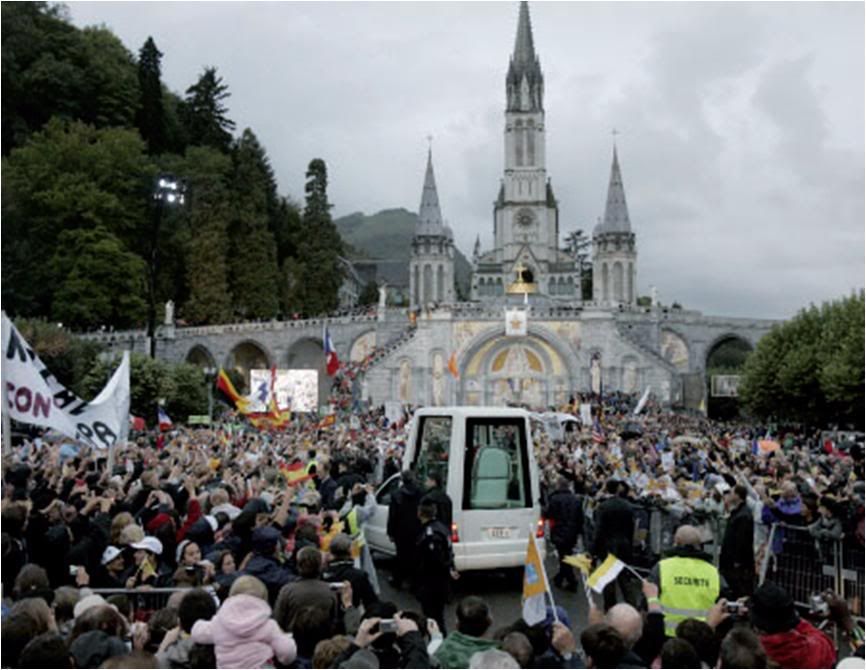
[Modificato da TERESA BENEDETTA 19/09/2008 03:11] |
 17/09/2008 14:16 17/09/2008 14:16 |
|
| | | OFFLINE | | Post: 15.019 | Registrato il: 28/08/2005
| Utente Gold | |
|
Thanks to Lella's blog
 Finally, a photo is available of the book RATZINGER PROFESSORE - and it has such a great picture
Finally, a photo is available of the book RATZINGER PROFESSORE - and it has such a great picture
of the Cardinal I am choosing to post it here rather than in POPE-POURRI!
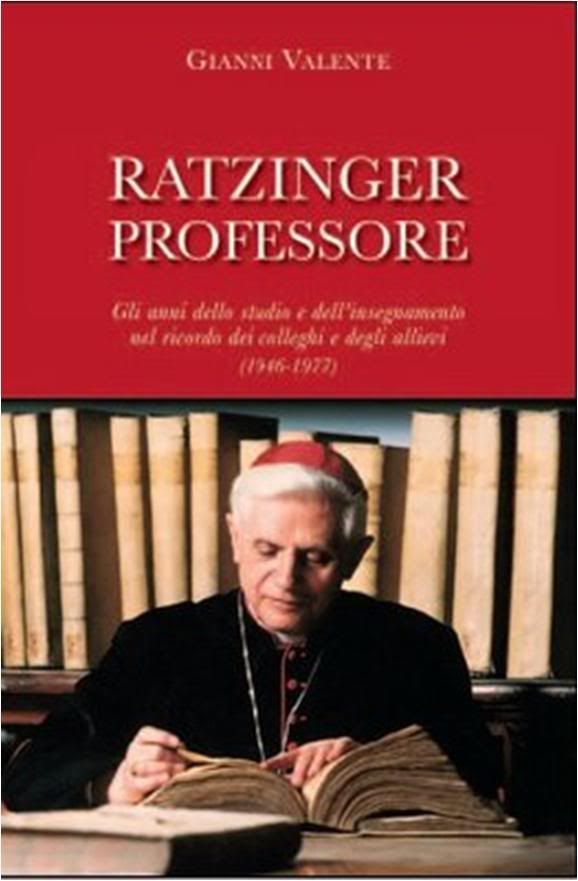
According to L'Occidentale, author Gianni Valente presented a copy of the book
to the Holy Father today, after the GA.
[Modificato da TERESA BENEDETTA 17/09/2008 14:18] |
 17/09/2008 18:35 17/09/2008 18:35 |
|
| | | OFFLINE | | Post: 15.021 | Registrato il: 28/08/2005
| Utente Gold | |
|
 Of a long list of 'must-translate' articles that have now piled up on the Pope's visit to France, I chose to start with this, which brought me to tears when I first read it, and yet again, as I translated it. I refer particularly to the powerful conclusion when the writer synthesizes what is, in effect, the message from Benedict XVI and the Catholic Church to the rest of the world.
The extraordinary equanimity
Of a long list of 'must-translate' articles that have now piled up on the Pope's visit to France, I chose to start with this, which brought me to tears when I first read it, and yet again, as I translated it. I refer particularly to the powerful conclusion when the writer synthesizes what is, in effect, the message from Benedict XVI and the Catholic Church to the rest of the world.
The extraordinary equanimity
of the 'man in white'
by Chantal Delsol
Translated from

15/09/2008
Editor's Note: An attentive member of the audience at Benedict XVI's address in the College des Bernardins on Sept. 12, philosopher Chantal Delsol says she was struck by the power that emanated from this Pope when he recalled what Europe owes Christianity.
Every time a Pope visits France, a more or less similar scenario unfolds. A great part of the media holds forth loudly, while the faithful mobilize.
Today, much more than with the last visits to France of John Paul II, it is the difference in style and tone that I find remarkable: aggression versus serenity.
Intellectuals and politicians have filled the pages of the major newspapers with vehement indignation: denouncing any alliance between the throne and the altar; accountability for 'millions of euros' purportedly drawn from the public coffers to receive a person who neither a political star nor an exotic celebrity [Too bad, he's not the Dalai Lama!]; an obsessive reference to the Crusades; scornful evocations of Christian churches for which the State pays not one centime to support.
And facing them, a small man in white walks on, surrounded by the roar of the crowd, without ostentation nor glory. He is calm. One sees in his demeanor a perseverance in the knowledge that the road is long but that he will never lack strength. He greets people modestly. He is a pilgrim, in short. Someone passing through.
He looks at the old world and notes, without bitterness nor acrimony, its loss of impetus, its emptiness, its fatal scorn.
Leaving the building, he stops to kiss two babies, then gets into his Popemobile. The faithful regroup around him in fervent joyful crowds. Young people chant Latin. It has been drummed into them that Latin means 'reactionary'. But that did not stop them, and obviously, they had simply ignored all the media sermonizing.
This small man gifted with a great brain (and no one can deny him that) goes to the microphone in front of an audience made up of Paris's elite. Of course, he knows exactly what they reject about him.
But he is neither a soldier (unlike his predecessor who seemed like a guerrilla come down from the hills - and at the time, we needed one like him), nor a politician.
No polemics, then. Nor any aggressiveness. He knew exactly who were in the audience: Many of them had defended Marxism until the fires burned out, and continue, with Sartrean bad faith, to identify the Church only with the Inquisition. Many of them are against the idea of truth itself and confuse tolerance with relativism, consider God the enemy of the human species, and have tried to make their naive readers believe that Europe has no identity except to be secular and fanatic about it.
He greets them with a neutral expression, as if he were about to give a lecture on Balzac's syntax. Then serves them with a lesson of high pedagogy (adapted to their way of understanding, of course - they cannot argue, as they do of George W. Bush - that he is an idiot) on the search for God.
On Paul's 'unknown God', and on the empty pursuit of God. On the fact that it is not simply a question of looking for God, but of allowing oneself to be found by God - well aware that he is in a land where one rejects God even more than simply ignoring him.
And he speaks bout freedom which, if it is claimed to be the mere absence of bonds and restraints, risks becoming arbitrary or lead to fanaticism (this last being the only word which the newspapers could find as a news hook - finally, a 'hot' term, or at least, one that can seem to be!).
He evokes those monks who, in their search for God, ended up laying the basis for Western culture. And this was a way of addressing those who behave like snotty brats claiming to owe nothing to no one. As if to say, "What would you be without this tradition on which you spit on now? You would not even have the words... Because it is this tradition that has conferred on you the freedom to spit."
But all this, in a quiet murmur, in a French that reminds us of Alsace.
He knows quite well that sitting in the audience was the former President of France on whose insistence the European Union had taken out any reference to the Christian roots of the continent in its founding documents.
He also knows that in this nation, anyone who speaks of the identity of one's culture is soon accused of wanting to provoke the clash of civilizations. But he manifestly ignores all that.
Like a professor, he describes that past from where we all came and which made us who we are, a past which we no longer want. He describes this identity with a kind of scientific neutrality: This is all part of history, and one cannot erase the past. And our negationist frenzy suddenly seems ridiculous.
The appeals for 'vigilance' have been building up to defend , they say, a secularism under threat (I mistrust this so-called 'vigilance' which is never vigilant of itself but only of what it considers the excess of others!).
Indeed, if secularity means excluding religion from the public sphere so that it can only be expressed in individual consciences - that is to say, only in the sculleries - this typically French secularity does not have much future left.
For one simple reason: Catholics no longer have a complex about being Catholic. They now profess themselves as much as other religions and currents of thought.
And that French secularity which is vengeful and aggressive will give way to the secularization of civilized countries: distinguishing between the Cross and the Sword, rather than suppressing the Cross even in a place that has emptied itself of God.
And this is the calm message that this modest figure and voice left us:
****
We exist. Christians exist. We exist far more than just in the sculleries and in silent consciences.
We influence those who govern, we offer educative models, we propose a way of life and a way of thinking. No one can relegate us. We represent the oldest and most durable institution that has ever existed in history. We built this continent.
If the 'vigilantes' of secularism today can claim the rights of man, which are now inalienable for all, it is because the monks of the 13th century followed in the steps of a God who upholds human dignity.
The Church not only founded what we are, but what will remain of us even after we no longer wish to exist.
But we don't claim anything beyond being who we are. Let the 'vigilantes' be assured: the Church has no powers. It can boast no armies but the heavenly host of angels who threaten no one, least of all, non-believers!
****
I am reassured by this 'powerlessness' as much as the secularists. One knows that the Church, like any other institution, can abuse its power by transforming its priests into domestic and political petty tyrants.
I love this disarmed Church, threatened by absenteeism, weakened, and borne along by hope rather than by satisfaction. It is a 'disarmament' embodied as well by this fragile and humble man in white.
France at the start of a new millennium, An old country whose elite for the most part hate Catholicism, and where a part of its people are rediscovering their religious roots as they find they need to give a sense to their life.
I look at a young employee on the Metro Friday morning who picked up one of those free newspapers of the sort that would hammer home the hate message: Your money is being wasted to welcome this country bumpkin of a pope! He reads the tirades, lays down the paper, and goes home, prepared to get up at six the next day to find a spot at the Invalides, where he will at least catch a glimpse of the white cap of the pilgrim Pope.
[Modificato da TERESA BENEDETTA 17/09/2008 19:34] |
 17/09/2008 19:28 17/09/2008 19:28 |
|
| | | OFFLINE | | Post: 15.022 | Registrato il: 28/08/2005
| Utente Gold | |
|
 Let me start my translation of the Italian articles with this original and insightful historical perspective offered by the ever-reliable and never predictable Gianni Baget Bozzo.
The novelty of Tradition
Let me start my translation of the Italian articles with this original and insightful historical perspective offered by the ever-reliable and never predictable Gianni Baget Bozzo.
The novelty of Tradition
as an answer to the secular challenge
by Gianni Baget Bozzo
Translated from

Sept. 16, 2008
Pope Benedict XVI's visit to the Church of France has allowed him to expose in all its amplitude the direction of his leadership,
In fact, it was the France of the 1940s that spawned a debate which pushed the church of France to consider Marxism a real threat and to look on the working class as an objective for evangelization - a debate that resulted in the working slogan for the Church of "France, a mission land".
This gave rise to the so-called worker-priests and the 'nouvelle theologie', which was built around the idea of a return to the origins, to the Fathers of the Church, in order to effect a change in the relationship between the Church and the world. [The 'ressourcement' school of Henri de Lubac and Yves Congar and Joseph Ratzinger at Vatican-II, as opposed to the 'aggiornamento' view.]
At the time, France was the center of Catholic thought, and it was in France that the climate emerged and spread which was to first suggest to the then Apostolic Nuncio to France, Angelo Giuseppe Roncalli, who would become John XXIII, the idea of a new Vatican Council.
In times that have changed radically since then, Pope Benedict XVI met the secular world - not just the Church of France - on his trip to Paris.
The Holy Father was welcomed by a President of France who wants to reopen a dialog with religions because he considers religion as a global phenomenon too vast and relevant to be ignored by a secularism which insists on denying it any opportunity to influence public life.
The Church of France is now distinctly a minority but still, the only common religious voice that France has. And Islam in France cannot be confronted only by secular means and on secular terms.
Benedict found an attentive and culturally prepared audience in the former medieval abbey of the Bernardins, in which he spoke once more of a central theme of his thought - the link between religious thought and human civilization. The Pope proposed the search of God by the medieval monks as the basis for European culture.
And then he went on to meet what remains of the Church in France at Lourdes, where miracles and the expectation of it are the stuff of daily life.
He met the government and institutions, culture and the faith. He showed how much the Church is rooted in the history of France and its exceptional spirituality in the city of Mary.
The great French Catholic culture of the past no longer exists, and France continues to be a true and proper land of mission. The Pope's trip was nothing less than a missionary voyage which owed much to the personal charism of Papa Ratzinger, the great theologian who has become the Pope of tradition.
An authoritative Pope who did not hesitate to tell the bishops of France not to sanctify 'de facto' unions and to be benevolent towards the faithful who wish to hear Mass according to the traditional liturgy of the Church.
But the most singular thing about the trip was that the Pope celebrated Mass at the Invalides, before the very dome under which rests Napoleon Bonaparte - the great Corsican who transformed the young Jacobin French republic into an empire that concluded a Concordat with the Vatican, the kind of secularity that the Church welcomes.
Tradition as an answer to the secular challenge - that is Pope Benedict's gauntlet. How will the Church of France respond to his message? It is also the challenge that this unusual Pontificate poses to the universal Church.
[Modificato da TERESA BENEDETTA 17/09/2008 19:29] |
 18/09/2008 03:17 18/09/2008 03:17 |
|
| | | OFFLINE | | Post: 15.023 | Registrato il: 28/08/2005
| Utente Gold | |
|
 Those who follow Father Z's blog will be aware that he is in Rome to attend a three-day conference of the Pontifical Commission Ecclesia Dei, where he once worked, to assess more or less what has happened since Summorum Pontificum went into effect on Sept. 14 last year. Because of the limited time I have had for the Forum, I have not been able to do any posts on it, but there's a lot that has piled up so far, including a major article in today's (9/18/08) OR. But let us set the stage.
'Italian bishops putting up
Those who follow Father Z's blog will be aware that he is in Rome to attend a three-day conference of the Pontifical Commission Ecclesia Dei, where he once worked, to assess more or less what has happened since Summorum Pontificum went into effect on Sept. 14 last year. Because of the limited time I have had for the Forum, I have not been able to do any posts on it, but there's a lot that has piled up so far, including a major article in today's (9/18/08) OR. But let us set the stage.
'Italian bishops putting up
roadblocks to the traditional Mass',
says #2 man in 'Ecclesia Dei'
Translated from

9/17/08
Most Italian bishops themselves are putting up roadblocks to the practice of the traditional Mass, according to Mons. Camille Perl, secretary of the Pontifical Commission Ecclesia Dei, which is in charge of liaison with traditionalist groups and with following up the implementation of the Papal Motu Proprio Summorum Pontificum.
Mons Perl said bluntly: "In Italy, the majority of bishops, with only a few admirable exceptions, have placed obstacles to the application of the Motu Proprio. And the same must be said of many superiors of religious orders who have prohibited their priests from celebrating Mass in the traditional rite."
A three-day meeting "The Motu Proprio Summorum Pontificum of His Holiness Benedict XVI - A spiritual richness for all the Church: One year later" opened Tuesday (Sept. 16) at the Vatican, organized by the association Giovani e Tradizione (Youth and tradition) with the sponsorship of Ecclesia Dei.
Mons. Perl made clear, however, that obstacles to the traditional Mass are also evident elsewhere: "In Germany, the bishops conference published a very bureaucratic directive which makes it difficult to apply the Motu Proprio."
He says the complaints from faithful who have been denied an opportunity to have the traditional Mass in their parishes come from a nucleus of countries that includes France, the United Kingdom, Canada, the United States and Australia.
Mons. Perl said a few young priests have taken the initiative to go ahead and celebrate the St. Pius V rite as revised by John XXIII without notifying their bishops.
However, he also acknowledged that the problem in France as in Germany is more generally the shortage of priests,
"The letters are piling up on my desk from faithful around the world who would like to have the traditional Mass available in their parish, But we must consider that there is a priest shortage everywhere, and that a priest who is already saying 4 or five Masses a day will find it difficult to add even one more. This is a problem for the country priests in France and Germany where a single priest usually has a wide territory to cover."
"We must also consider that the liturgical reform of Paul VI has been in use for 40 years, and there are many priests who do not know how to say the traditional Mass - not to mention that they have been indoctrinated on the erroneous fact that the traditional rite has been abrogated."
"But there are many young priests who want to celebrate the Mass in Latin, and I think that the Pope was also thinking of them when he wrote the Motu Proprio."
In the United States, Mons. Perl added, there are many who willingly travel for miles just to get to a Church where the traditional Mass is celebrated because it is not available in their own parish.
"But we should remember it's only been a year - and that's very short in the life of the Church - but we can also understand that many faithful are frustrated because they had thought the Motu Proprio would have a more immediate and widespread application."
But he thinks, for instance, that after a year, the climate is better.
"It is not the intention to put the new rite on trial," except that the post-Conciliar liturgy "is a mixture of old and new which often results in a lack of harmony and some conclusion," Mons. Perl said.
Andrea Tornielli in
 filed a report citing the statements made by Mons. Perl but adds some interesting comments from Cardinal Castrillon Hoyos, the president of Ecclesia Dei.
filed a report citing the statements made by Mons. Perl but adds some interesting comments from Cardinal Castrillon Hoyos, the president of Ecclesia Dei.
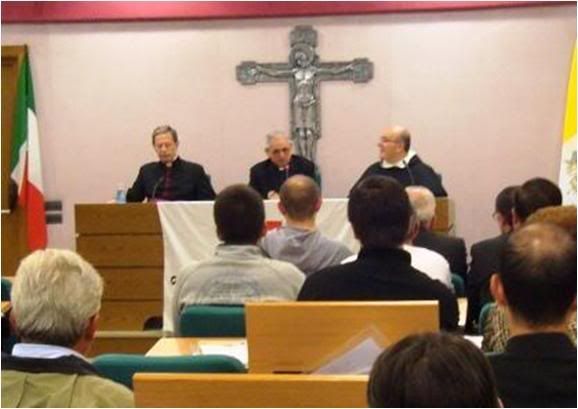 Fr. Z provides this picture of Cardinal Castrillon between Mons. Nuara, moderator, and Mons. Perl (right).
Fr. Z provides this picture of Cardinal Castrillon between Mons. Nuara, moderator, and Mons. Perl (right).
.....
Cardinal Castrillon criticized the 'insatiability' of some traditionalists, saying for example that some of them had requested that Santa Maria Maggiore, one of four papal Basilicas in Rome, be used exclusively for the traditional rite.
He also said that those who speak of 'victory' when the Pope gives Communion to the faithful who kneel and receive the Host on the tongue, are wrong to do so and are not helping Benedict XVI's plan at all.
He said some traditionalists appear to be driven more by wanting to assert "power rather than love".
Benedict XVI in issuing the Motu Proprio normalizing the traditional Mass had said he intended it as an act of conciliation, holding out a hand to the traditionalists and looking forward to a reciprocal enrichment of both Roman rites.
On the flight to France last week, the Pope said he intended the Motu Proprio as an act of 'tolerance and love" for those who feel attached to the old rite, and was not in any way turning back from Vatican-II.
He also pointed out that the traditionalists are very much in the minority and that the reformed rite remains the ordinary rite of the Church.
Earlier, Vatican Radio had this interview with one of the leading liturgists at the Vatican:
Translated from
the Italian service of

[After a brief introduction about the three-day conference, the report continues:]
At the conference, progress made, as well as difficulties encountered are being discussed.
When Pope Benedict XVI met with the bishops of Frances in Lourdes on Sunday, he expressed the wish for a 'pacification of spirits' over the issue, reminding them that "no one can be excluded from the Church" and that "everyone, without exception, must be able to feel at home, and never rejected."
Fabio Colagrande spoke to don Nicola Bux, liturgist and consultant to the Congregation for the Doctrine of the Faith:
FR. BUX: The Pope's statements in France, saying that no one should be excluded from the Church, should lead everyone,s tarting with the bishops and priests, to reflect on the concept of communion. It is not something that we construct ourselves, it is something we receive from the Lord, from history, from tradition - and that is why we are all involved in this communion.
We are not the masters. And liturgy is nothing but an expression of this communion of the Church which extends across time and peoples, with the past centuries, with the generations that came before us and those to come. This, too, is the sense of the pope's Motu Proprio.
He has written about it many times, when he was a theologian and cardinal. Everyone speaks of pluralism - this has become one of those 'magic' words. We do not profess the Creed of a pluralistic Church - we profess the one Church, but we also profess the catholic Church, which means a global inclusion not just of people bit also of the expressions of faith. We know that faith is not expressed in one way alone.
For instance, we all know there is the Oriental Church which has its own rites. So why should we question if there are two forms of the Roman rite? Besides even in the West, we have always held a variety of liturgies which still exist - the Ambrosian, the Dominican, the Gallican, the Mozarabic, along with the Roman rite. So to be open on this question is also a sign of culture.
You, Fr. Bux, are giving a lecture to the conference on the patient reform being undertaken by Benedict XVI bridging tradition and innovation...
Yes. I must say that I myself have always advocated reasonable innovations. I celebrate the ordinary rite daily, but I have never refused to celebrate the extraordinary form. I do not think there is an opposition between the two forms, but as the Holy Father says, the possibility of mutual enrichment. But one must try something to believe in it.
Cardinal Dario Castrillon Hoyos has remarked that in a proper interpretation of the Motu Proprio, the bishops should not simply just look on as the faithful ask their parish priests for the traditional Mass. They should be telling the faithful to draw from the traditional Mass as part of the patrimony of our tradition.
The bishops should be more courageous.It is important to promote the sense of the sacred and of mystery even in the New Mass.
Why do you think that everytime the Pope talks about this subject, as he did most recently in France, the newspapers then report it as a reproach to the Pope, accusing him of closing himself up in conservatism...
Whoever knows Joseph Ratzinger form his writing would never accuse him of conservatism. The point is to understand that there is no true innovation that cuts off tradition. And to get rid of so-called fears - such as that this amounts to going back on Vatican-II, something that is completely out of the question.
We need openness, both on the part of those who have these concerns, as well as from those who are attached to tradition, because this can only bring salutary good to one and the other, but above all, to the Church.
CNS reported Cardinal Castrillon's comments:
Cardinal Castrillon on griping
by some traditionalists
By Cindy Wooden

ROME, Sept. 16 (CNS) -- Rather than being grateful, some people have reacted to Pope Benedict XVI's wider permission for the celebration of the Tridentine Mass with further demands, said Cardinal Dario Castrillon Hoyos.
The cardinal, president of the Pontifical Commission "Ecclesia Dei," spoke Sept. 16 at a conference marking the first anniversary of "Summorum Pontificum," the document by which Pope Benedict expanded access to the Tridentine rite, the Mass rite used before the Second Vatican Council.
Cardinal Castrillon, whose commission works with communities using the old rite, said his office continues to receive letters requesting the Tridentine rite be used not just at one Mass a week but at every Mass, and that such Masses be available not just at one church in a town but at every church.
He said he even got a letter demanding that Rome's Basilica of St. Mary Major be dedicated exclusively to the celebration of the Tridentine-rite Mass.
Such people, he said, are "insatiable, incredible."
"They do not know the harm they are doing," Cardinal Castrillon said, adding that when the Vatican does not accept their demands immediately "they go directly to the Internet" and post their complaints.
The cardinal and officials in his office have been saying for more than a year now that they were preparing detailed instructions responding to questions about how to implement the papal document, which said the Mass in the new Roman Missal, introduced in 1970, remains the ordinary way of Catholic worship.
Asked about the status of those detailed instructions, Cardinal Castrillon told Catholic News Service that his office had completed its work and passed the draft on to the pope, who would make the final decision about its publication.
In addition to responding to the desire of Catholics who wanted more frequent and easier access to Mass celebrated in the old rite, the pope's 2007 document was seen as a major step toward reconciliation with the followers of the late French Archbishop Marcel Lefebvre, who was excommunicated when he ordained four bishops against the express wishes of Pope John Paul II.
But the process of reconciliation broke down in late June when Bishop Bernard Fellay, superior of the Society of St. Pius X and one of the four bishops ordained by Archbishop Lefebvre, failed to meet four conditions posed by Cardinal Castrillon for moving the process forward.
"The Eucharist should never become a point of contrast and a point of separation," Cardinal Castrillon said at the Sept. 16 conference. "What is more important: the mystery of God who becomes bread or the language by which we celebrate the mystery?"
The cardinal said the Mass -- in whatever language it is celebrated -- must be a service motivated by love and "never a sword" used against other Christians.
By making it easier for priests to celebrate the older liturgy and for the faithful to have access to it, he said, "the vicar of Christ (the pope) was not just exercising his task of governing, but was exercising his task of sanctifying" the people of God.
"When we are before the greatest expression of love for humanity -- the Eucharist -- how can we fight?" Cardinal Castrillon asked.
[Modificato da TERESA BENEDETTA 18/09/2008 13:46] |
 18/09/2008 13:03 18/09/2008 13:03 |
|
| | | OFFLINE | | Post: 15.025 | Registrato il: 28/08/2005
| Utente Gold | |
|

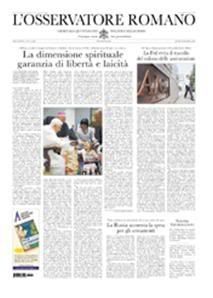
The Pope reports on his trip to France at the General Audience:
'The spiritual dimension guarantees freedom and secularity'
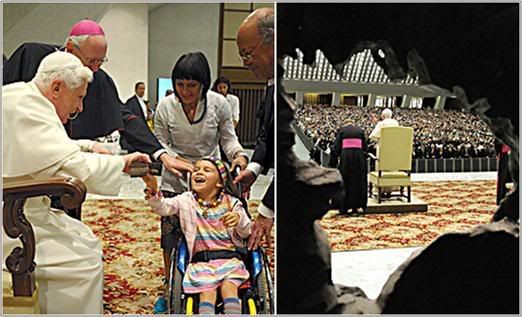 Other Page 1 stories: The US government steps in to prevent the collapse of insurance
Other Page 1 stories: The US government steps in to prevent the collapse of insurance
giant AIG; and Russia raises its expenditures for armaments.
THE POPE'S DAY
The Holy Father met today with
- H.E. Madame Jasna Krivošić-Prpić, the new Ambassador from Bosnia-Herzegovina, who presented her credentials.
AAddress in English.
- Bishops of Panama on ad-limina visit
- Participants in the symposium on Pope Pius XII sponsored by the US-based pave the way Foundation.
Address in English.
The Vatican Press Office has a reminder:
On Sunday, September 21, the Holy Father will be celebrating Mass at the Cathedral of Albano Laziale
in the Alban Hills, during which he will dedicate a new altar. The Mass starts at 9:30.
BOSNIA AND HERZEGOVINA:
CONSOLIDATING RECONCILIATION

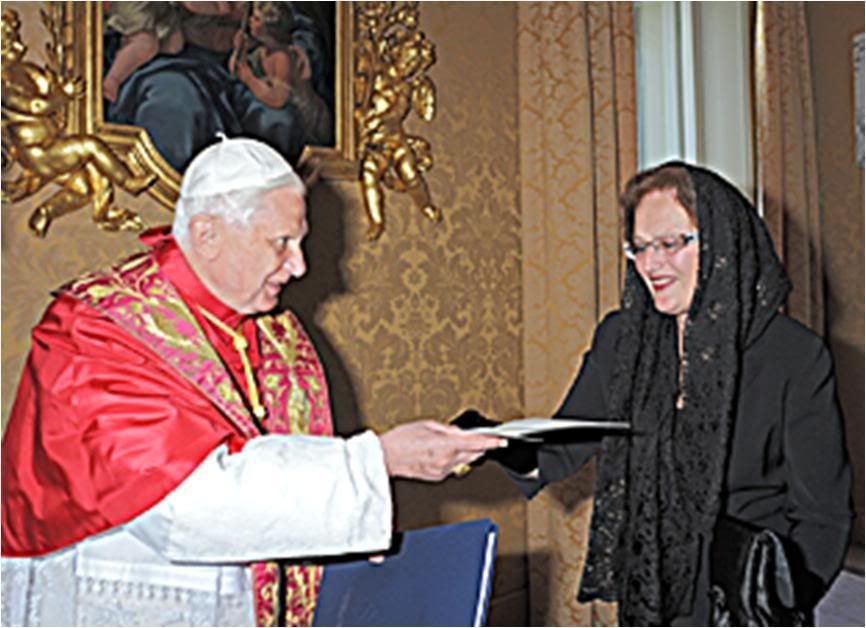
VATICAN CITY, 18 SEP 2008 (VIS) - This morning in the Apostolic Palace of Castelgandolfo, Benedict XVI received the Letters of Credence of Jasna Krivosic-Prpic, the new ambassador of Bosnia and Herzegovina to the Holy See.
Addressing the diplomat in English, the Pope recalled how Bosnia and Herzegovina "contains a rich mix of cultures and precious patrimonies. Tragically, however, cultural and ethnic differences throughout history have not infrequently been a source of misunderstanding and friction, ... as each of the three constitutive peoples that make up your country know only too well".
"No person wishes for war", he went on. "No civic or religious group should ever resort to violence or oppression. Yet, so many families in your land have been subjected to the suffering which results from these calamities. Listening to the voice of reason, however, and prompted by the hope that we all desire for ourselves and the generations which follow, every individual can find the strength to overcome past divisions".
The Holy Father acknowledged "the progress being made to consolidate gestures of reconciliation", and he encouraged the international community "to continue its efforts to assist Bosnia and Herzegovina to this end. I trust that, in accepting the facts of regional history and the grave lessons to be learnt from recent years, the courage will be found to build a future with a healthy sense of solidarity.
"A State's spirit is shaped at many levels", he added. "The family home is where children learn the essential values of responsibility and harmonious coexistence. It is here too that prejudices are either born or broken. Every parent therefore has the grave duty to instil in their children, through example, respect for the dignity that marks every person irrespective of ethnicity, religion or social grouping".
"Good schooling not only attends to the cognitive development of children but to the civic and spiritual as well. Teachers ... can do much to discredit any false anthropological ideologies that contain seeds of hostility and to foster an appreciation of cultural and religious diversity in the life of a country".
The communications media, the Pope insisted, "can do much to overcome lingering attitudes of distrust by ensuring that they do not become tools of prejudice but rather transcend particular interests and promote broad-based and inclusive civic goals, thus becoming instruments at the service of greater justice and solidarity".
At the same time, the State "is called to pursue with vigour its responsibility to strengthen the institutions and extol the principles which lie at the heart of all democracies. ... I am sure that the constitutional reforms which your government is currently studying will address the legitimate aspirations of all citizens, guaranteeing both the rights of individuals and social groups", he said.
"For her part the Church in Bosnia and Herzegovina", Pope Benedict concluded, "will continue to assist in the attainment of the goals of reconciliation, peace and prosperity. ... She exercises her mission of universal charity in its threefold form: material, intellectual and spiritual. ... The promotion of spiritual and moral values ... not only forms part of the transmission of religious traditions but also nourishes the wider culture, motivating men and women of goodwill to strengthen ties of solidarity and to manifest how a united society can indeed arise from a plurality of peoples".
THE HISTORICAL TRUTH
ABOUT PIUS XII

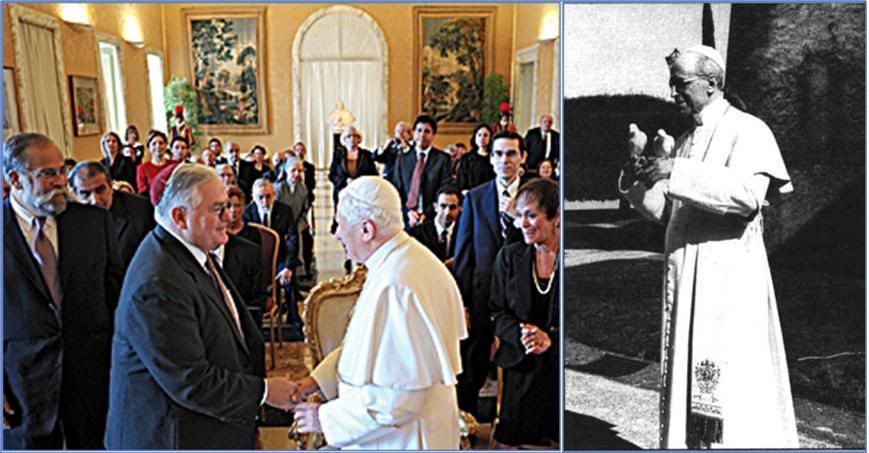
VATICAN CITY, 18 SEP 2008 (VIS) - At midday today in Castelgandolfo, the Pope met participants in a symposium on the life and the pastoral and humanitarian work of Pius XII. The symposium was promoted by the Pave the Way Foundation, the president of which is Gary Krupp.
Having mentioned the fact that 50 years have passed since the death, on 9 October 1958, of Servant of God Pius XII, the Holy Father pointed out that although "so much has been written and said of him during these last five decades, ... not all of the genuine facets of his diverse pastoral activity have been examined in a just light.
"The aim of your symposium", he added continuing his English-language talk, "has been precisely to address some of these deficiencies, conducting a careful and documented examination of many of his interventions, especially those in favour of the Jews who in those years were being targeted all over Europe, in accordance with the criminal plan of those who wanted to eliminate them from the face of the earth.
"When one draws close to this noble Pope, ... one can come to appreciate the human wisdom and pastoral intensity which guided him in his long years of ministry, especially in providing organised assistance to the Jewish people.
"Thanks to the vast quantity of documented material which you have gathered, supported by many authoritative testimonies, your symposium offers to the public forum the possibility of knowing more fully what Pius XII achieved for the Jews persecuted by the Nazi and fascist regimes", said the Holy Father.
He then highlighted how the work of the symposium had drawn attention to Pope Pius's "many interventions, made secretly and silently, precisely because, given the concrete situation of that difficult historical moment, only in this way was it possible to avoid the worst and save the greatest number of Jews. This courageous and paternal dedication was recognised and appreciated during and after the terrible world conflict by Jewish communities and individuals who showed their gratitude for what the Pope had done for them".
Pope Benedict thanked the Pave the Way Foundation "for its ongoing activity in promoting relationships and dialogue between religions, as witnesses of peace, charity and reconciliation.
"It is my great hope", he concluded, "that this year, which marks the 50th anniversary of my venerated predecessor's death, will provide the opportunity to promote in-depth studies of various aspects of his life and his works in order to come to know the historical truth, overcoming every remaining prejudice"
Pope defends wartime pontiff Pius XII
By ALESSANDRA RIZZO

VATICAN CITY, Sept. 18 (AP) - Pope Benedict XVI said Thursday that his predecessor Pius XII spared no effort to save Jews from the Nazis, one of the strongest Vatican defenses of a Pontiff accused of silence during the Holocaust.
Benedict said during a meeting with a U.S.-based interfaith group that he wanted any prejudice against Pius to be overcome, praising what he called Pius's "courageous and paternal dedication" in trying to save Jews.
"Wherever possible he spared no effort in intervening in their favor either directly or through instructions given to other individuals or to institutions of the Catholic Church," Benedict said.
Pius XII reigned from 1939 to 1958 and was a Vatican diplomat in Germany, and its secretary of state before that. Some historians say that he did not do everything in his power to prevent Jews from being deported to concentration camps. His supporters say he made every effort to help Jews and other victims through quiet diplomacy.
Benedict said that Pius's many interventions were "made secretly and silently, precisely because, given the concrete situation of that difficult historical moment, only in this way was it possible to avoid the worst and save the greatest number of Jews."
The Vatican has rejected the accusations against Pius, and has started the process for his beatification. But the process has gone on for some years and there's been no indication that it is moving forward.
Pius's wartime conduct is an unresolved issue in the Vatican's delicate relations with Israel and with Jews, many of whom share in the criticism of Pius.
Jews and others have accused him of not speaking out loudly enough against the Holocaust. Six million Jews were killed by the Nazis.
Last year, the caption of a photo of Pius at Yad Vashem Holocaust memorial in Jerusalem was the subject of a public spat between the Holy See and Israel. The caption said Pius did not protest the Nazi genocide of Jews and maintained a largely "neutral position."
In Italy, under Pius's papacy, convents opened up their doors to hide Jews during the Nazi occupation.
Benedict said the interfaith Pave the Way Foundation had gathered material that showed the extent of Pius' efforts. The group, based in New York, is active in improving Catholic-Jewish relations and organized a symposium in Rome on Pius.
"So much has been written and said of him during these last five decades and not all of the genuine facets of his diverse pastoral activity have been examined in a just light," the Pope said during the meeting with members of the group in Castel Gandolfo, the papal summer retreat.
"One can also come to appreciate the human wisdom and pastoral intensity which guided him in his long years of ministry, especially in providing organized assistance to the Jewish people," Benedict said.
The Pope said Pius's efforts were recognized by Jewish communities and individuals during and after World War II. He said that on Nov. 29, 1945, shortly after the end of the conflict, 80 delegates of German concentration camps came to the Vatican and thanked Pius "for his generosity to them."
The German-born Benedict, a [compulsory!] member of the Hitler Youth when he was a seminarian [he was a schoolboy] and has made a point of reaching out to Jews, following in the footsteps of his predecessor, John Paul II.
He has publicly condemned the Nazi regime and mentioned the Holocaust on several occasions. During a trip to Poland in 2006, he prayed at the Auschwitz concentration camp.
This year is the 50th anniversary of Pius's death, and Benedict said he hoped that commemorations would provide the opportunity for further study "in order to come to know the historical truth, overcoming every remaining prejudice."
[Modificato da TERESA BENEDETTA 19/09/2008 01:29] |
 18/09/2008 13:24 18/09/2008 13:24 |
|
| | | OFFLINE | | Post: 15.026 | Registrato il: 28/08/2005
| Utente Gold | |
|
 Cardinal Vingt-Trois says
Cardinal Vingt-Trois says
the time is right
for a new secularism
by Anita Bourdin

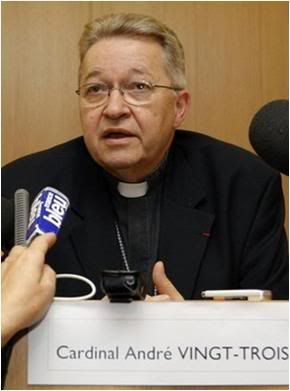
LOURDES, France, SEPT. 17, 2008 (Zenit.org).- The religious history of Europe calls for the "open secularism" that Benedict XVI promoted in his visit to France, says the archbishop of Paris.
Cardinal André Vingt-Trois affirmed this Sunday in Lourdes during a meeting with journalists. The Pope was in France from Friday through Monday, stopping in Paris and Lourdes, in the context of the 150th anniversary of the Virgin Mary's apparitions there.
During the press conference, the president of the French episcopal conference weighed in on the debate in France regarding the role of religious belief in public life.
Some voices have opposed President Nicolas Sarkozy's remarks advocating a "positive secularity," claiming that secularism does not have adjectives.
The cardinal, however, noted how at the end of the 19th and beginning of the 20th century, there emerged in Europe a movement whose objective was "to combat Catholicism."
The 1871-1880 Kulturkampf, a conflict led by Otto von Bismarck against the Catholic Church, was not, as the chancellor of the German empire himself said, "directed against Islam or Judaism," the cardinal recalled.
"And in the title of the French law called 'Separation of Churches and State,' as the whole world knew, the Church from which one must separate was, in fact, the Catholic Church," he said. "This question of the secularity of the political system and the state has been lived controversially and from a militant perspective. But the state does not exhaust society's expressions."
"Historical ups and downs," Cardinal Vingt-Trois continued, referring to the history of France since World War I, have led "to progress in a pragmatic practice of secularism, putting militancy aside, and leading, instead, to a coexistence that we can call peaceful."
"The step taken by President Sarkozy," in his discourse at the Basilica of St. John Lateran in Rome on Dec. 20, 2007, and in Riyadh, Saudi Arabia, on Jan. 14, 2008, has made it possible "to present an analysis of social functioning in which religious membership ceases to be a taboo, and is considered as a specific contribution that is useful for the life of society."
"To say that this approach is 'open secularism' means that we no longer find ourselves in a situation in which one could cooperate with social services on the condition of staying quiet about the motives for such participation. One could be a good citizen 'despite being a believer.' Today one can say that it is not impossible to be 'a good citizen because one is a good believer.' That's not the same thing," he stressed.
"This means that many men and women, who have committed themselves to non-confessional social service activities, such as the 'Restos du Coeur' [Refectories of the Heart, a social service promoted by French musicians and actors], for example, can express at least part of their reasons for doing so and are not embarrassed."
Nevertheless, some views of secularism still maintain that Catholic activities, engaged in for religious reasons, cannot be manifested. The cardinal called for an end to the shadows of the prosecution to which religious congregations were subjected at the beginning of the 20th century in France.
"It is not embarrassing for a Catholic to try to put solidarity into practice," the cardinal said. "It is not a crime that must be punished by the courts."
[Modificato da TERESA BENEDETTA 18/09/2008 13:34] |
 18/09/2008 14:51 18/09/2008 14:51 |
|
| | | OFFLINE | | Post: 15.027 | Registrato il: 28/08/2005
| Utente Gold | |
|
 I was unable to check the reporting in the UK papers (nor in the German papers, for that matter- mea culpa, mea culpa, mea maxima culpa!) about the Pope's visit to France, but I assumed they would cover it adequately.
I was unable to check the reporting in the UK papers (nor in the German papers, for that matter- mea culpa, mea culpa, mea maxima culpa!) about the Pope's visit to France, but I assumed they would cover it adequately.
Is there something wrong with my Googling, or is it that, incredibly, the Times of London reported not a single line about it? The search shows their last report mentioning the Pope was on Sept. 5, about his carryng an organ donor card!
Here are two items of interest from the Daily Telegraph.
Why Anglican England
is better than secular France
By Urmee Khan (on Faith World)

Sept 15, 2008
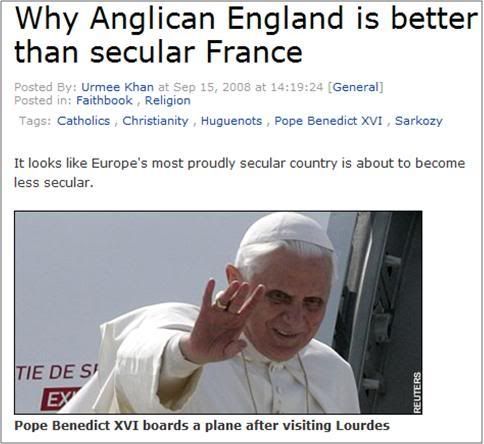
It looks like Europe's most proudly secular country is about to become less secular.
The French Republic, belligerently secular since the Revolution, and whose separation of church and state is encoded in a 1905 law, may start according a special role to the Catholic Church; that at least is one interpretation of comments by President Nicolas Sarkozy that a new, "positive secularity" should recognise the central place of religion in the country. "It would be crazy to deprive ourselves of religion" he said - "[it would be] a failing against culture and against thought".
His remarks came on Friday as he welcomed Pope Benedict XVI to France, who is visiting to celebrate the 150th anniversary of the supposed appearance of the Blessed Virgin Mary at Lourdes.
Opposition figures united in condemnation of the President - to such an extent that on Sunday the Pope had to reassure nervous anti-clericalists that the Church does not seek to usurp the state.
France and Britain could hardly be more different. To say that religion has a central role to play in life would be completely unremarkable were it to come from the mouths of Gordon Brown, David Cameron or even the atheist Nick Clegg (in passing, let's not forget that Britain has never had an avowedly atheist Prime Minister).
Needless to say, this is hardly surprising on one level, since we aren't a secular country. But it's an interesting dimension to the usual narrative of the Godless Brits that religion's role in politics has rarely been more heavily debated.
In France, secularism is - as it were - an article of faith. That's why Muslim schoolgirls tying to wear the hijab got themselves in such hot water, accused of superstition by their affronted fellow citizens (though hopefully not by any who are today marking the anniversary of the Marian appearance to young Bernadette Soubirous).
As ever the President's comments are a symptom not of the strength of Catholicism but its weakness. The CIA World Factbook (has a more prosaic website ever had a more dramatic name?) lists Catholics as a thumping 83 to 88 % of the population.
But in surveys where French people describe their own religion, it's a lot less - one survey in 2003 by the pollsters IFOP gave Catholics as 65%, and other surveys give the figure as a little over 50%. Incidentally, someone's asserted in Wikipedia that the French haven't collected religious data since the Third Republic, so if that's true it might explain some of the confusion.
As for Protestants, there almost aren't any - not since Pope Benedict's predecessors had the St Bartholomew's Day Massacre and kicked out the Huguenots. [Now, that's a low blow, even if it is historical fact. Not sure it was the Pope at the time who instigated it, though.]
As we know, thousands of the Huguenots came here, and provoked some vicious anti-immigrant riots in Elizabethan and Jacobean London. Shakespeare lived with a Huguenot family - (I'm told that there's a great book, "The Lodger" by Charles Nicholl, all about it).
Let's spare a thought for the French Protestants - in fact we can spare more than a thought - we can join them in prayer. Because, slightly unbelievably, there are still two thriving Huguenot churches to this day - the French Protestant Reformed Church in Brighton, and an original Huguenot Church in Soho Square in London, an extraordinary building nestled between the media company Tiger Aspect and a gay bar.
Are their weekly Francophone services attended by actual Huguenots, who have contrived to avoid assimilation for centuries, or by theological history re-enactors? A sudden, impulsive conviction on my part to find out the answer by actually going and, you know, talking to them, the way journalists are meant to do, fell victim to Sunday morning lethargy.
The lack of diversity in modern French Christianity might contribute to its feelings of being under siege. Arguably, of course, France is not the most secular country in Europe - Turkey is.
And therein of course lies an irony, for Turkey is the wrong kind of secular - and this might help us to paint some of the context to Sarkozy's comments.
In response to Turkey's attempt to join the EU, some French secularists suddenly come over as all crusadery.
"Every schoolchild knows that Asia Minor does not form part of Europe," said M. Sarkozy in his campaign to be elected President.
Former President Giscard d'Estaing, among many other French politicians, extols Europe's historical mission as the cockpit of Christendom as a reason to keep Turkey out. [And yet, it was he who spearheaded the successful drive to keep out any mention of Christianity in the preamble of the still-unratified European Constitution! Talk about duplicity for political expediency!]
And there's perhaps an echo of this idea if the Pope's comments in Lourdes today that France should "bring to the fore" its Christian roots.
To those of other faiths and those of none, Anglican England is looking a warmer home than the brittle secularism of France.
Don't be so smug. The American model works best in this context, and other Western nations would do well to emulate it.
 The news story in the Telegraph on the same day was remarkable for at least three things - 1) a headline that is not consistent with the new report itself (the Pope's remarks about secularity were made to the French bishops, not in the Mass homily); 2) construing the Pope's statement to the bishops as a 'defense' of Sarkozy - as though the Pope were playing local politics at all; and 3) the report about some Lourdes shopkeepers complaining their sales of B16 items are abysmal compared to John Paul-II.
Pope seeks to heal Sarkozy rift
The news story in the Telegraph on the same day was remarkable for at least three things - 1) a headline that is not consistent with the new report itself (the Pope's remarks about secularity were made to the French bishops, not in the Mass homily); 2) construing the Pope's statement to the bishops as a 'defense' of Sarkozy - as though the Pope were playing local politics at all; and 3) the report about some Lourdes shopkeepers complaining their sales of B16 items are abysmal compared to John Paul-II.
Pope seeks to heal Sarkozy rift
By Henry Samuel in Paris

15 Sep 2008
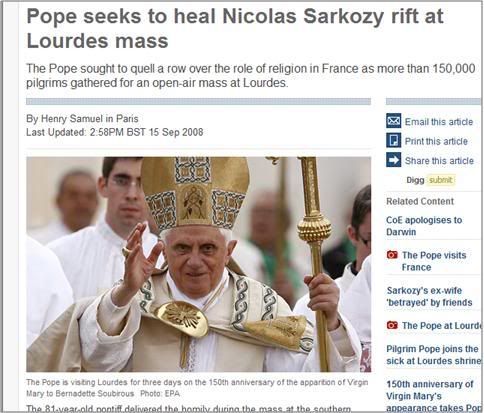
The Pope sought to quell a row over the role of religion in France as more than 150,000 pilgrims gathered for an open-air mass at Lourdes.
The 81-year-old Pontiff delivered the homily during the Mass at the southern French shrine where Roman Catholics believe the Virgin Mary appeared to the peasant girl Bernadette Soubirous 150 years ago.
"The power of love is stronger than the evil which threatens us," the Pope told pilgrims.
Benedict also sought to calm a row over what role religion should play in France's strictly secular state, a debate inflamed by President Nicolas Sarkozy ahead of the papal visit.
The French leader, a twice-divorced and lapsed Catholic, broke a French taboo during a trip to the Vatican last year by calling for a "positive secularism" that would allow space for religion in public life.
Church and state in France are separated by a 1905 law. Last Friday, Mr Sarkozy said it would be "folly" for France to turn away from religion.
Opposition figures in France leaped on Mr Sarkozy's words. "There is no such thing as positive or negative secularism, open or closed, tolerant or intolerant. There is secularism. It's a republican principle," said the Socialist leader François Hollande.
"It's not up to the President to explain to citizens that without religion, nothing is possible," warned Manuel Valls, another Socialist.
At Lourdes the Pope sought to calm the row. " The Church does not claim the state's place. She does not want to substitute it," he told French bishops. But he called on France to "bring to the fore" its Christian roots, which "will enable each inhabitant to better understand his country."
Without reference to Mr Sarkozy, the Pontiff stuck to his hard line on divorced Roman Catholics who wish to remarry, saying the Church will not open up to the practice. [In fairness to Sarkozy, I don't think, unlike Rudy Giuliani, he has sought to receive Communion in his present status, so the Pope's statement of Catholic teaching could not have been directed to Sarkozy in any way!]
The Church "firmly maintains the principle of the indissolubility of marriage," he told French bishops.
Conceding that remarried Catholics were in "a particularly painful situation," the Pope stressed that the church would continue to regard "with the greatest affection."
But, he added, "initiatives aimed at blessing irregular unions cannot be admitted."
The Pope has used his first trip to France to deliver a "pep talk" to the country's Catholics, whose numbers are falling fast. According to one recent poll, 51 per cent of French people consider themselves Catholic, down from 80 per cent in the early 1990s, while only 10 per cent attend mass regularly.
Twice as many faithful turned out when Benedict's predecessor John Paul II visited Lourdes.
While fervour surrounding the Pope's visit has been higher than expected, local vendors of the religious trinkets now an integral part of the Lourdes experience complained that custom was slow compared to when his predecessor, Jean Paul II, visited.
The verdict from souvenir shops was reportedly unanimous: sales of candles, caps, flags and T-shirts featuring the new Pope are woeful – symbolic of that fact that the "distant" Benedict XVI is not as much a crowd-puller as his predecessor. [And how does one conclude that simply because sales may be lower for B16 items??? And this reporter is still peddling this line after everything that happened in Paris and Lourdes! And in Cologne and Poland and Spain and Bavaria and Brazil and the US and Australia - and at the Vatican!!! The guy has a deep-seated prejudice, and he is using two shopkeepers in Lourdes to 'prove' his prejudice!]
"The image of the current Pope doesn't sell yet," one vendor told Le Parisien. "Sales have been terrible," said another selling Bordeaux wine with a Pope label.
Their cries of frustration may fall on deaf ears: at an outdoor Mass in Paris on Saturday in Paris, the Pontiff urged a crowd of 260,000 to ward against "insatiable greed," declaring that "the love of money is the root of all evil".
 In fact, the coverage of the Pope's visit to France by the major British papers was so minimal I could fit it all in one post - if there was anything worth posting. The Guardian has one brief item saying the Pope was in Lourdes; the Independent had two - one about the Pope's arrival in Paris (with emphasis on the harmony between him and Sarkozy about positive secularity - and a single sentence to acknowledge that he also addressed a group of French intellectuals) and another one on his first mass in Lourdes; and the Daily Mail had one story on the day he arrived in Paris, with only the first two paragraphs devoted to saying he had arrived in France and was welcomed by Sarkozy, and the rest an anticipation of his schedule in France.
In fact, the coverage of the Pope's visit to France by the major British papers was so minimal I could fit it all in one post - if there was anything worth posting. The Guardian has one brief item saying the Pope was in Lourdes; the Independent had two - one about the Pope's arrival in Paris (with emphasis on the harmony between him and Sarkozy about positive secularity - and a single sentence to acknowledge that he also addressed a group of French intellectuals) and another one on his first mass in Lourdes; and the Daily Mail had one story on the day he arrived in Paris, with only the first two paragraphs devoted to saying he had arrived in France and was welcomed by Sarkozy, and the rest an anticipation of his schedule in France.
Perhaps even more shocking to me is that even Damian Thompson has said not a word about it on his blog for the Telegraph!
[Modificato da TERESA BENEDETTA 18/09/2008 15:09] |
 18/09/2008 16:05 18/09/2008 16:05 |
|
| | | OFFLINE | | Post: 15.028 | Registrato il: 28/08/2005
| Utente Gold | |
|
 How to summarize the Pope's
How to summarize the Pope's
lecture at Bernardins -
the Pope does it at the GA
Translated from

To condense in a few words, in a news report, a 4000-word academic lecture is not an easy undertaking. Especially when the lecture is that delivered by Benedict XVI on September 12 at the College des Bernardins in Paris.
In fact, almost all the Italian papers except Avvenire and Il Foglio -did not even try! Of that superlative lecture, they practically reported nothing.
And yet, it is not impossible to do! The culture pages in every newspaper are intended to do just that - report on events of this nature. The newspapers could have reported the Pope's lecture there in its entirety or in parts, as they often do for texts of far less importance - accompanying it with a framework and a brief summary.
But what the Italian newspapers did not do, Joseph Ratzinger himself did, for the faithful at the General Audience today. In a few lines, he provided both the framework or context of the lecture, and a synthesis.
The context:
The visit began in Paris, where I symbolically met with the entire French people, rendering homage to a beloved nation in which the Church, as early as the second century A.D., has played a fundamental role in its development.
It is interesting that it is precisely in this context that the need matured for a healthy distinction between the political sphere and the religious, according to Jesus's famous saying: "Render to Caesar what belongs to Caesar, and to God what belongs to God" (Mk 12,17).
If Caesar's image was impressed on Roman coins meaning that they were to be given to him, the imprint on the Creator, the only Lord of our life, is in the heart of man.
Authentic secularity is, therefore, not to do without the spiritual dimension, but to acknowledge that it is precisely this, at the root, which is the guarantee of our freedom and of the autonomy of earthly realities, thanks to the dictates of the creative Wisdom that the human conscience can grasp and act upon.
The synthesis:
This is the same context for the ample reflection I developed on "The origins of Western theology and the roots of European culture" in a meeting with the world of culture, in a place that was chosen for its symbolic value.
This was at the College des Bernardins, which the lamented Cardinal Jean-Marie Lustiger, had envisioned as a center for cultural dialog - a 12th century edifice constructed by the Cistercian monks, where young people came to study. It was the very presence of this monastic theology that was at the origin of our Western culture.
My address started with a reflection on monasticism, whose purpose was to search for God - quaerere Deum. In a time of profound crisis for ancient civilization, the monks, oriented by the light of faith, chose the master way (via maestra): that of listening to the Word of God.
Thus they became the great custodians of Sacred Scriptures, and the monasteries became schools of wisdom and schools 'dominici servitii' - in the service of the Lord - as St. Benedict called them.
The search for God, by its very nature, thus brought the monks to a culture of words. Quaerere Deum, to search for God - in the wake of his own Word. Therefore, they had to seek to know this Word ever more and profoundly. They had to penetrate the secret of language and understand it in its structure.
To search for God, revealed to us in Sacred Scriptures, the 'profane' sciences became important in trying to grasp the secret of languages. Thus, the monasteries developed that eruditio which allowed the formation of a culture.
Because of this, 'quarere Deum', to be on the way towards God, remains today as in the past the 'via maestra' and the foundation of every true culture.
One wonders, indeed, if the flood of instant commentary by almost every media Tom, Dick and Harriet on the Regensburg lecture might ever have been made were it not for the polemical hook that the media attached to it - even if some of these opportunistic commentators did acknowledge that the lecture was really about faith and reason and not a slam of Islam!
 Meanwhile, here is a commentary on the Bernardins lecture from a French philosopher, one of many that I have yet to translate:
Professor Ratzinger's 'Ratio'(Reason):
Meanwhile, here is a commentary on the Bernardins lecture from a French philosopher, one of many that I have yet to translate:
Professor Ratzinger's 'Ratio'(Reason):
A French philosopher sees the irony
and 'delectable effects' of
the Pope's Bernardins lecture
Translated from

Sept. 16, 2008
Among those in the audience for Pope Benedict XVI's lectio magistralis at the College des Bernardins was Pierre Manent, a disciple of the great contemporary political philosopher Raymond Aron, and one of the political philosophers today who is most sensitive to the critique of modernity.
The author of key works on liberalism, and a versatile scholar who has written commentaries on Cicero, Thomas Aquinas and Adam Smith, Manent says he finds a 'delicious irony' in that it is the Pope - "precisely he who, in the eyes of modern rationalism represents superstition, rejection of reason, and sacrifice of the intellect, who has brought the theme of reason into the foreground".
Manent, a liberal Catholic neo-Thomist and a Straussian [would it be Leo Strauss, the neo-con/theo-con political guru, or Claude Levi-Strauss, the French anthropologist who has influenced much of French thought in the second half of the 20th century?], is convinced that the principal currents of contemporary philosophy do not trust reason: "They are anti-rationalist or irrational. Today, the only school of thought that upholds reason as a rule and guideline for thought and life is the Catholic Church. And the one who brought this classic concept to contemporary thought has been Benedict XVI."
And this is the paradox of the Pope's lecture in Paris, capital of positivistic rationalism. A lesson in theology in which the origins of Western monasticism uncover the roots of European culture and what civilization owes Christianity, but it serves above all to warn the contemporary conscience against the threats of a subjective freedom that is devoid of transcendence, but is instead dedicated to atomism, and of the religious fanaticism that goes with fundamentalist intolerance.
"The essence of Prof. Ratzinger's lecture," said Manent, "is his overall view of how European culture developed, at least in its fundamentals, starting with the medieval monks' Quaerere Deum, the search for God. This is the most singular aspect of the lecture. With monasticism as a starting point, he sowed how the search for God - through how God is announced and revealed in Scriptures - meant a new relationship with language, with the Scriptures and with the community
[that receives the Scriptures]."
And so, Manent points out, from those two words alone - quaerere Deum - the Pope was able to derive the entire development of the European.
Further more, Manent says, "It is very impressive that at the very moment when he enters into the heart of his deductions - namely, in the relationship that Christianity established between Scriptures and the community - the Pope also demonstrated that there cannot be a Catholic fundamentalism, for the simple reason that Scriptures are a system of texts that are closely bound to a specific religious teaching - therefore, a system that makes sense only in the effects it produces among its believers."
"Yes, we might even say that Benedict XVI had delicately and implicitly distinguished the Bible from the Koran in that way, underscoring clearly as he did why it was that Christianity cannot be considered a religion of the Book [as Islam is]".
Without going over the undue furor causes by the Regensburg lecture of 2006, a careful reading of the Bernardins lecture shows how much importance Ratzinger gives to this particularness of Christianity that made it the matrix of European culture.
"Interpretation and dialog are two key aspects underlined by the Pope. And in this, he explained how Scriptures are inseparable from the community that it inspired and shaped."
Since Scriptures are a collection of texts of different natures, their unity becomes concrete only if there is a community that interprets it, and "in this sense, I believe the Pope very admirably showed the precise relation between Logos and community. And it is a relation that belongs to Catholicism, and mutatis mutandis, developed by European culture, even after it started to separate itself from the Catholic dogmas of faith and obedience."
Manent finds Benedict XVI's reading extremely interesting because "he opens a perspective that renews our overall view of Western development, offering reflections not only for Catholics but for whoever is interested in understanding what Europe means. He offers a non-eclectic synthesis of the Europe of philosophy and the Europe of Christianity."
And that is why, even in secular France, homeland of Voltairean rationalism, perhaps religion has returned to the heart of philosophical and political reflection.
It is not enough to oppose the idea of a largely de-Christianized nation, Manent says, but the Church, too, must gain new strength.
"When all the spiritual traditions are on the way to extinction, when Communism no longer exists, when the 1968 movements have been reduced to pathetic annual meetings of their survivors, then the perceived weakness of the Church in France is relative strength, because with respect to the average state of the nation, it does show a presence and an activity, and even sometimes, an intelligence, that allows us to be hopeful."
Manent praises President Sarkozy. "He has been very good on this. He has barely touched on the question of the relationship between faith and reason, but he insists on the central place that reason must have in democracy. Today, democratic legitimacy no longer seems to be based on rational grounds, but on emotional reasons, if we look at the aggressive concept of equality for all taken literally, the fact that everyone lives as he pleases because he wants to. Therefore, to link the defense of reason by Benedict XVI to an authentic concept of democracy is a wise choice. Sarkozy has made it very clear that it would be absurd for a democracy to deprive itself of the contributions that religious can make to the public discourse. That was very daring of him but also very judicious, and with that, he has begun to give content to what he calls 'positive secularity'."
Asked if he thought this could be a turning point for secularism, Manent answered: "I could not say now whether it is a historical turn, but I do believe that many now realize that secularist hardening is no longer reasonable, and that it is time to confront intelligently the question of being open to the contribution that religions can make. When any nation - not only France but the other nations of Europe - appears to be very impoverished and permeated by a sense of inaction, depression and sterility, then there comes an awareness of the need to use all available resources to revitalize it.
"And even if the Church may have been weakened, Catholicism, religion and faith continue to be a resource even for non-Catholics. In fact, there is no more reason to continue regarding the Catholic church with suspicion and intolerance, because the Church no longer has either the desire nor the means to be intolerant herself."
 On the same day, Il Foglio editor Giuliano Ferrara, self-described 'devout atheist' and brilliant advocate of the Catholic position on the most important public issues, published his own commentary of the Bernardins lecture, which he entitled "Benedict XVI's French canticle". I will post a translation as soon as I can.
On the same day, Il Foglio editor Giuliano Ferrara, self-described 'devout atheist' and brilliant advocate of the Catholic position on the most important public issues, published his own commentary of the Bernardins lecture, which he entitled "Benedict XVI's French canticle". I will post a translation as soon as I can.
[Modificato da TERESA BENEDETTA 18/09/2008 20:55] |
 18/09/2008 17:06 18/09/2008 17:06 |
|
| | | OFFLINE | | Post: 15.029 | Registrato il: 28/08/2005
| Utente Gold | |
|
 Pope Benedict will not
Pope Benedict will not
attend 'Encounter of Families'
in Mexico because of
altitude considerations

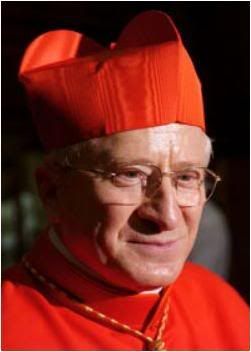 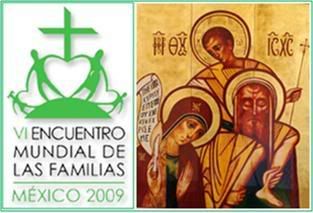
VATICAN CITY, Sept. 18 (Translated from APCOM) - Benedict XVI has declined the invitation to come to Mexico City for the World Encounter of Families on January 13-19 to avoid the possible stress on his health by altitude problems in a city which is 2240 meters (7190 feet) above sea level, after yet another long intercontinental trip.
[It must be remembered that many athletes had altitude problems during the Mexico Olympics of 1968. High altitudes require the heart to pump harder in order to compensate for the relative oxygen deficiency in high-altitude air.]
This was announced today by Cardinal Ennio Antonelli, president of the Pontifical Council for the Family, which oversees the World Encounters.
"The Pope is in good health," he made clear, "but he is no youth. His doctors have advised against the visit to Mexico City because of the altitude."
He assured the Mexican people and the event organizers that "Benedict XVI loves the Mexican people and is greatly committed to the cause of the family".
Therefore, he said he will participate in some way at the Mexico Encounter via TV broadcasts at appropriate moments.
John Paul II attended the 1997 Encounter in Rio de Janeiro but did not go to Manila for the next Encounter in 2003 because of health reasons.
Benedict XVI took part at the last World Encounter in Valencia, Spain, in July 2006. He was to have presided at the concluding Mass of the Encounter in Mexico at the Shrine of Our Lady of Guadalupe.
Hours later, here's how the AP reported the story as they picked it up from the Apcom (and ANSA) reports.
Vatican says Pope too old
to travel to Mexico City
VATICAN CITY, Sept. 18 (AP) - A cardinal says that Pope Benedict XVI will not attend an event in Mexico City next year because the city sits too high above sea level for someone his age.
The Pope had been invited to attend the World Family Day in January. But Cardinal Ennio Antonelli of the Pontifical Council for the Family said Thursday that the 81-year-old pope would not take part.
Antonelli said "the Pope is in good health, but he's no longer a young man," according to the ANSA and Apcom news agencies. Mexico City is more than 2200 meters (7300 feet) above sea level.
Antonelli said the decision was made as a precaution, and said organizers were thinking of ways for the Pope to participate, possibly by videoconference.
[Modificato da TERESA BENEDETTA 19/09/2008 01:18] |
 19/09/2008 03:02 19/09/2008 03:02 |
|
| | | OFFLINE | | Post: 15.031 | Registrato il: 28/08/2005
| Utente Gold | |
|
 Remember this story from last July? I posted a mini-round-up about it on Page 196 of this thread
freeforumzone.leonardo.it/discussione.aspx?idd=354494&p=196
and now, Richard Owen has saved me translating an update from the Italian news agencies today.
Italian Minister of Justice
Remember this story from last July? I posted a mini-round-up about it on Page 196 of this thread
freeforumzone.leonardo.it/discussione.aspx?idd=354494&p=196
and now, Richard Owen has saved me translating an update from the Italian news agencies today.
Italian Minister of Justice
will not lay charges
over insult to Pope
by Richard Owen in Rome

September 18, 2008
Angelino Alfano, the Italian Minister of Justice, yesterday Thursday said he had refused a request by the public prosecutor in Rome for permission to charge the comedienne and satirist Sabina Guzzanti with insulting Pope Benedict XVI.
Ms Guzzanti had said during a lef-t wing rally in Rome in July that because of the Church's stand on homosexuality the Pope would go to Hell, where he would be tormented by "very active poofter devils".
Under the 1929 Lateran Treaty between Italy and the Vatican, an offence to the Pontiff carries the same weight as an offence to the Italian head of state, with a penalty of up to five years in prison. However prosecution requires the go-ahead from the Justice Ministry.
Mr Alfano said he had decided not to proceed with a prosecution "knowing the depth of the Pope's capacity for forgiveness". Speaking at the Catholic University in Milan the minister said that as a Roman Catholic himself he had been "saddened and shamed" by Ms Guzzanti's remarks.
However she had accepted full responsibility for them, and he saw "no point in adding further fire to the flames".
Here was the reaction from the Vatican:
Wise decision, case closed,
says Fr. Lombardi

VATICAN CITY, Sept. 18 (Translated from Apcom) - The decision of the Justice Minister, Angelino Alfano, not to authorize filing charges against actress Sabina Guzzante for insulting the Pope is "wise, and there is no objection on the part of the Vatican," according to Fr. Federico Lombardi, director of the Vatican press office.
"Although the episode in which disrespectful and offensive statements were made was certainly deplorable," he told newsmen, "there is no use or need to revisit it."
"The authority of the Pope and his stature are too elevated to be trampled on," Lombardi said, "and as far as he is concerned, the case is closed."
What was so galling about Guzzante's rant was that the demonstration was against Prime Minister Berlusconi and his touch action against immigrants, and had nothing to do with the Church or the Pope. But she wouldn't have made any headlines at all if she had ranted against Berlusconi, would she?
[Modificato da TERESA BENEDETTA 19/09/2008 23:16] |
|
|
|
|